Strategic and Commissioning in Health Care: A Contemporary Approach
VerifiedAdded on 2023/04/22
|22
|5885
|133
AI Summary
This report explores the range of contemporary approaches to strategic commissioning within the health care environment. It covers the strategic commissioning framework, priorities for NHS England, and involving patients in developing a whole system vision. The report also discusses the NHS Five Year Forward View, the model of care, and the principles of strategic commissioning of NHS England.
Contribute Materials
Your contribution can guide someone’s learning journey. Share your
documents today.
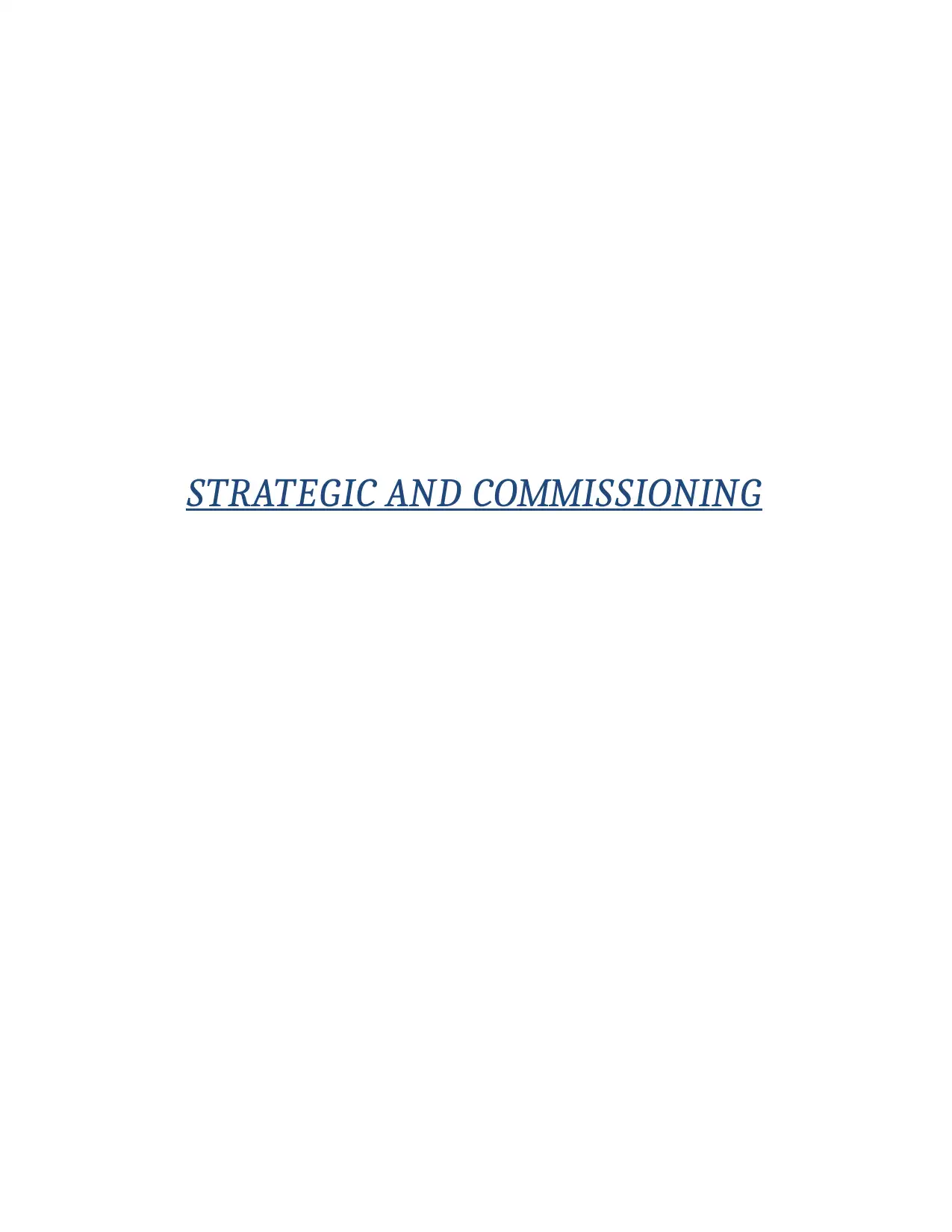
STRATEGIC AND COMMISSIONING
Secure Best Marks with AI Grader
Need help grading? Try our AI Grader for instant feedback on your assignments.
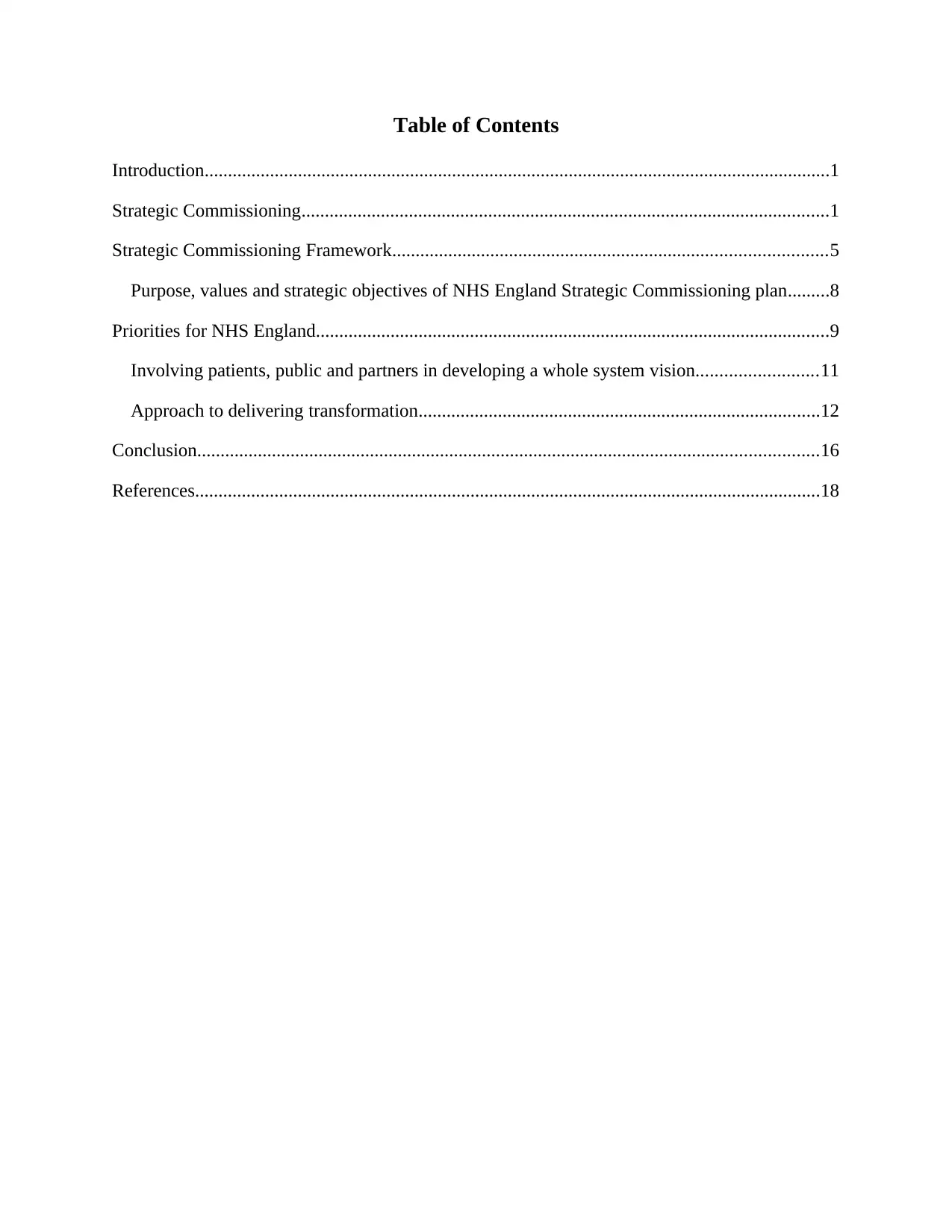
Table of Contents
Introduction......................................................................................................................................1
Strategic Commissioning.................................................................................................................1
Strategic Commissioning Framework.............................................................................................5
Purpose, values and strategic objectives of NHS England Strategic Commissioning plan.........8
Priorities for NHS England..............................................................................................................9
Involving patients, public and partners in developing a whole system vision..........................11
Approach to delivering transformation......................................................................................12
Conclusion.....................................................................................................................................16
References......................................................................................................................................18
Introduction......................................................................................................................................1
Strategic Commissioning.................................................................................................................1
Strategic Commissioning Framework.............................................................................................5
Purpose, values and strategic objectives of NHS England Strategic Commissioning plan.........8
Priorities for NHS England..............................................................................................................9
Involving patients, public and partners in developing a whole system vision..........................11
Approach to delivering transformation......................................................................................12
Conclusion.....................................................................................................................................16
References......................................................................................................................................18
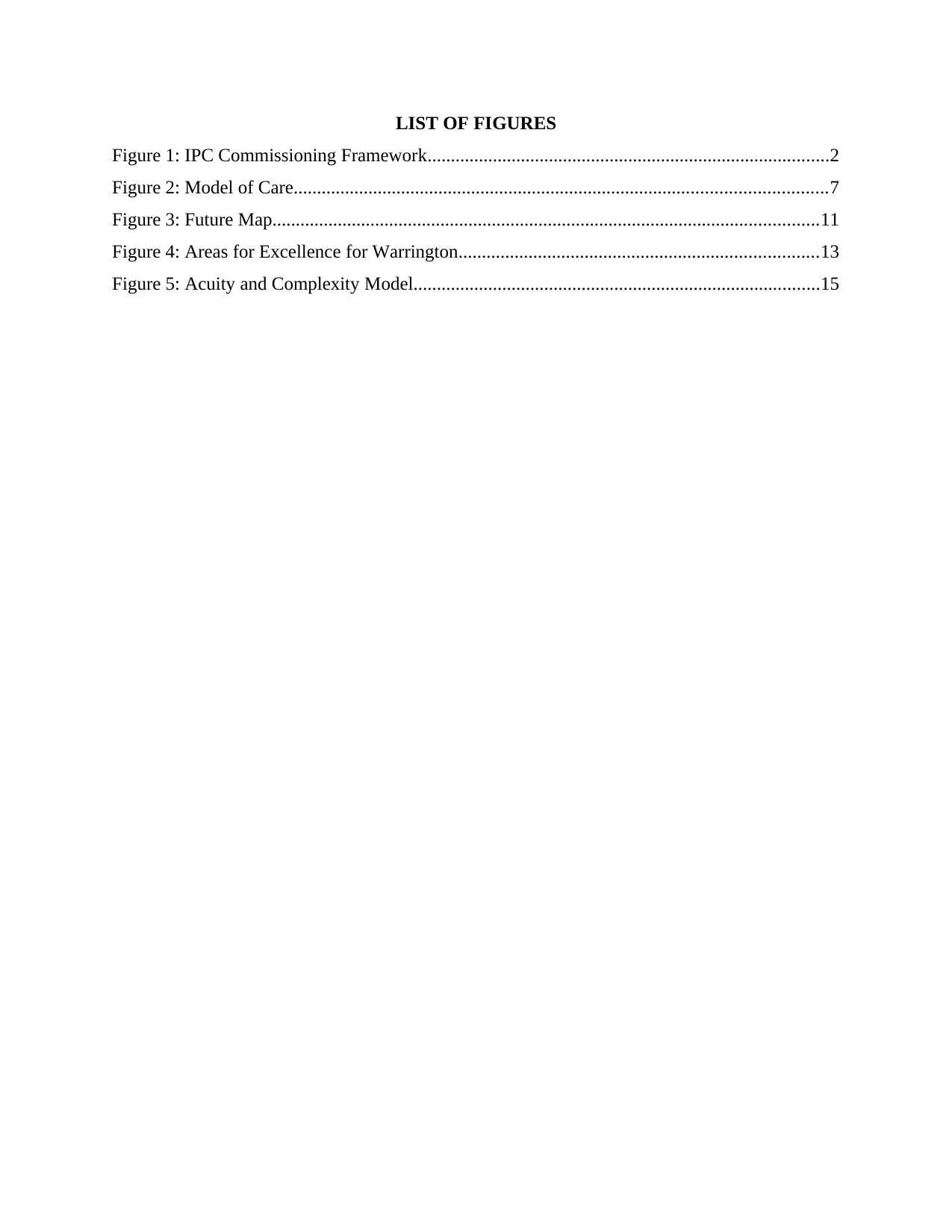
LIST OF FIGURES
Figure 1: IPC Commissioning Framework......................................................................................2
Figure 2: Model of Care..................................................................................................................7
Figure 3: Future Map.....................................................................................................................11
Figure 4: Areas for Excellence for Warrington.............................................................................13
Figure 5: Acuity and Complexity Model.......................................................................................15
Figure 1: IPC Commissioning Framework......................................................................................2
Figure 2: Model of Care..................................................................................................................7
Figure 3: Future Map.....................................................................................................................11
Figure 4: Areas for Excellence for Warrington.............................................................................13
Figure 5: Acuity and Complexity Model.......................................................................................15
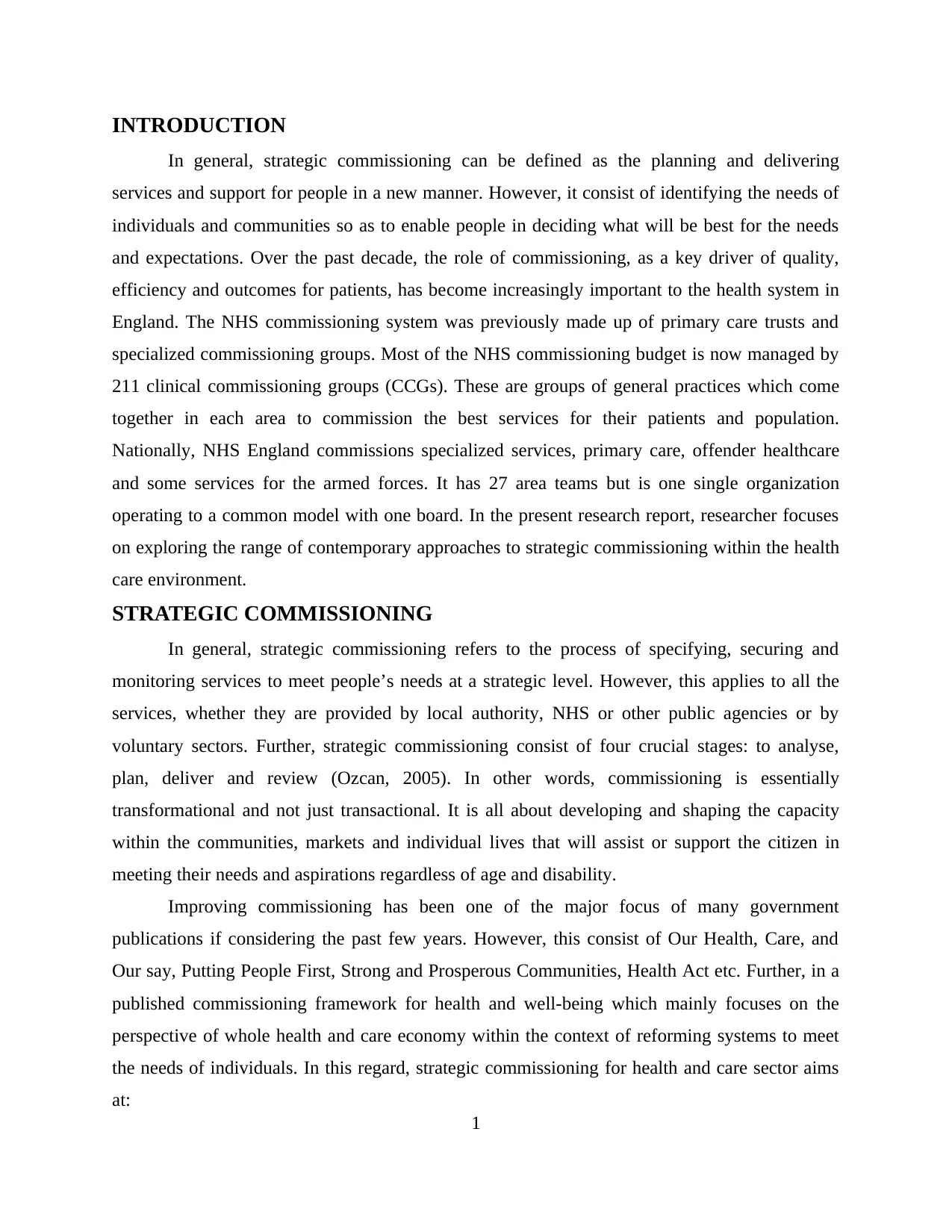
INTRODUCTION
In general, strategic commissioning can be defined as the planning and delivering
services and support for people in a new manner. However, it consist of identifying the needs of
individuals and communities so as to enable people in deciding what will be best for the needs
and expectations. Over the past decade, the role of commissioning, as a key driver of quality,
efficiency and outcomes for patients, has become increasingly important to the health system in
England. The NHS commissioning system was previously made up of primary care trusts and
specialized commissioning groups. Most of the NHS commissioning budget is now managed by
211 clinical commissioning groups (CCGs). These are groups of general practices which come
together in each area to commission the best services for their patients and population.
Nationally, NHS England commissions specialized services, primary care, offender healthcare
and some services for the armed forces. It has 27 area teams but is one single organization
operating to a common model with one board. In the present research report, researcher focuses
on exploring the range of contemporary approaches to strategic commissioning within the health
care environment.
STRATEGIC COMMISSIONING
In general, strategic commissioning refers to the process of specifying, securing and
monitoring services to meet people’s needs at a strategic level. However, this applies to all the
services, whether they are provided by local authority, NHS or other public agencies or by
voluntary sectors. Further, strategic commissioning consist of four crucial stages: to analyse,
plan, deliver and review (Ozcan, 2005). In other words, commissioning is essentially
transformational and not just transactional. It is all about developing and shaping the capacity
within the communities, markets and individual lives that will assist or support the citizen in
meeting their needs and aspirations regardless of age and disability.
Improving commissioning has been one of the major focus of many government
publications if considering the past few years. However, this consist of Our Health, Care, and
Our say, Putting People First, Strong and Prosperous Communities, Health Act etc. Further, in a
published commissioning framework for health and well-being which mainly focuses on the
perspective of whole health and care economy within the context of reforming systems to meet
the needs of individuals. In this regard, strategic commissioning for health and care sector aims
at:
1
In general, strategic commissioning can be defined as the planning and delivering
services and support for people in a new manner. However, it consist of identifying the needs of
individuals and communities so as to enable people in deciding what will be best for the needs
and expectations. Over the past decade, the role of commissioning, as a key driver of quality,
efficiency and outcomes for patients, has become increasingly important to the health system in
England. The NHS commissioning system was previously made up of primary care trusts and
specialized commissioning groups. Most of the NHS commissioning budget is now managed by
211 clinical commissioning groups (CCGs). These are groups of general practices which come
together in each area to commission the best services for their patients and population.
Nationally, NHS England commissions specialized services, primary care, offender healthcare
and some services for the armed forces. It has 27 area teams but is one single organization
operating to a common model with one board. In the present research report, researcher focuses
on exploring the range of contemporary approaches to strategic commissioning within the health
care environment.
STRATEGIC COMMISSIONING
In general, strategic commissioning refers to the process of specifying, securing and
monitoring services to meet people’s needs at a strategic level. However, this applies to all the
services, whether they are provided by local authority, NHS or other public agencies or by
voluntary sectors. Further, strategic commissioning consist of four crucial stages: to analyse,
plan, deliver and review (Ozcan, 2005). In other words, commissioning is essentially
transformational and not just transactional. It is all about developing and shaping the capacity
within the communities, markets and individual lives that will assist or support the citizen in
meeting their needs and aspirations regardless of age and disability.
Improving commissioning has been one of the major focus of many government
publications if considering the past few years. However, this consist of Our Health, Care, and
Our say, Putting People First, Strong and Prosperous Communities, Health Act etc. Further, in a
published commissioning framework for health and well-being which mainly focuses on the
perspective of whole health and care economy within the context of reforming systems to meet
the needs of individuals. In this regard, strategic commissioning for health and care sector aims
at:
1
Secure Best Marks with AI Grader
Need help grading? Try our AI Grader for instant feedback on your assignments.
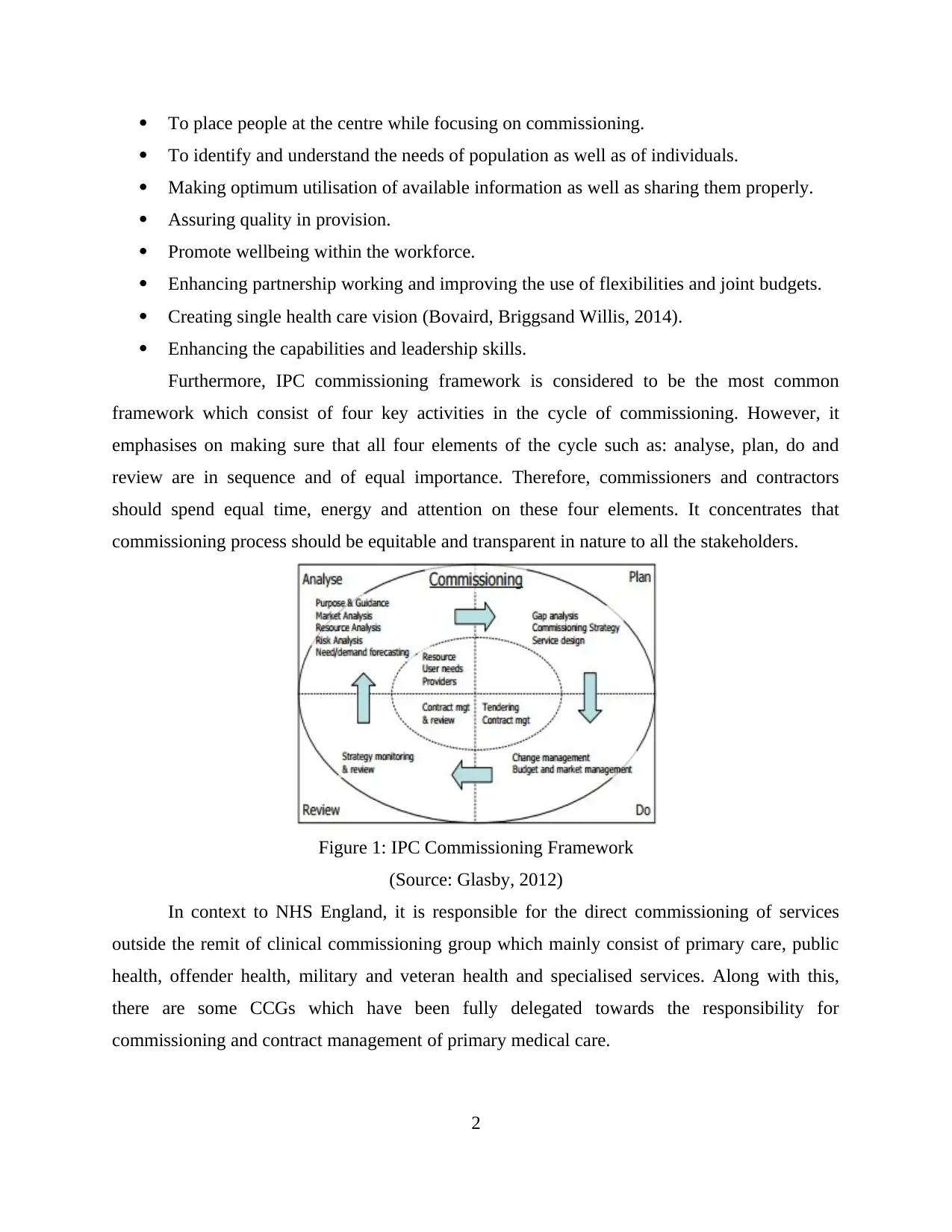
To place people at the centre while focusing on commissioning.
To identify and understand the needs of population as well as of individuals.
Making optimum utilisation of available information as well as sharing them properly.
Assuring quality in provision.
Promote wellbeing within the workforce.
Enhancing partnership working and improving the use of flexibilities and joint budgets.
Creating single health care vision (Bovaird, Briggsand Willis, 2014).
Enhancing the capabilities and leadership skills.
Furthermore, IPC commissioning framework is considered to be the most common
framework which consist of four key activities in the cycle of commissioning. However, it
emphasises on making sure that all four elements of the cycle such as: analyse, plan, do and
review are in sequence and of equal importance. Therefore, commissioners and contractors
should spend equal time, energy and attention on these four elements. It concentrates that
commissioning process should be equitable and transparent in nature to all the stakeholders.
Figure 1: IPC Commissioning Framework
(Source: Glasby, 2012)
In context to NHS England, it is responsible for the direct commissioning of services
outside the remit of clinical commissioning group which mainly consist of primary care, public
health, offender health, military and veteran health and specialised services. Along with this,
there are some CCGs which have been fully delegated towards the responsibility for
commissioning and contract management of primary medical care.
2
To identify and understand the needs of population as well as of individuals.
Making optimum utilisation of available information as well as sharing them properly.
Assuring quality in provision.
Promote wellbeing within the workforce.
Enhancing partnership working and improving the use of flexibilities and joint budgets.
Creating single health care vision (Bovaird, Briggsand Willis, 2014).
Enhancing the capabilities and leadership skills.
Furthermore, IPC commissioning framework is considered to be the most common
framework which consist of four key activities in the cycle of commissioning. However, it
emphasises on making sure that all four elements of the cycle such as: analyse, plan, do and
review are in sequence and of equal importance. Therefore, commissioners and contractors
should spend equal time, energy and attention on these four elements. It concentrates that
commissioning process should be equitable and transparent in nature to all the stakeholders.
Figure 1: IPC Commissioning Framework
(Source: Glasby, 2012)
In context to NHS England, it is responsible for the direct commissioning of services
outside the remit of clinical commissioning group which mainly consist of primary care, public
health, offender health, military and veteran health and specialised services. Along with this,
there are some CCGs which have been fully delegated towards the responsibility for
commissioning and contract management of primary medical care.
2
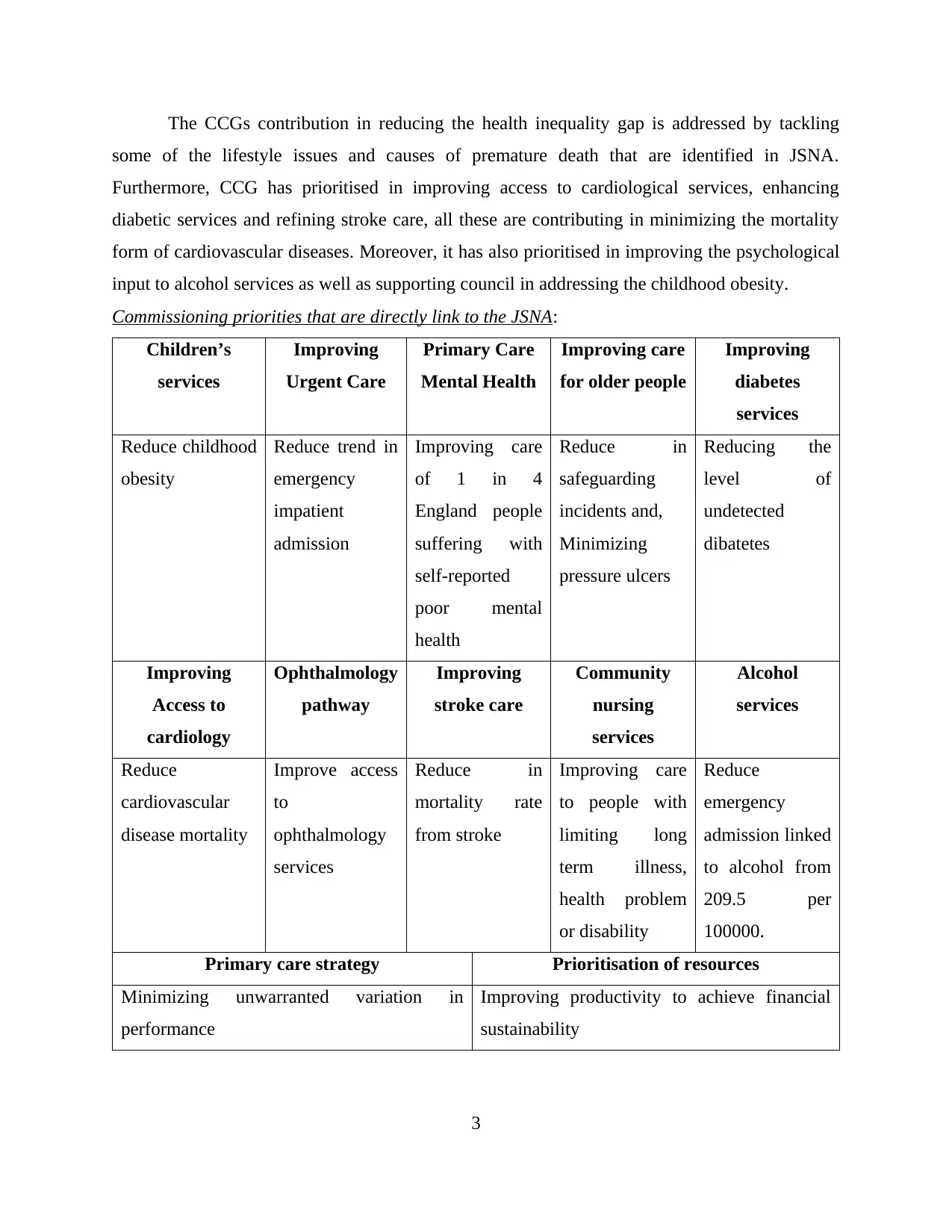
The CCGs contribution in reducing the health inequality gap is addressed by tackling
some of the lifestyle issues and causes of premature death that are identified in JSNA.
Furthermore, CCG has prioritised in improving access to cardiological services, enhancing
diabetic services and refining stroke care, all these are contributing in minimizing the mortality
form of cardiovascular diseases. Moreover, it has also prioritised in improving the psychological
input to alcohol services as well as supporting council in addressing the childhood obesity.
Commissioning priorities that are directly link to the JSNA:
Children’s
services
Improving
Urgent Care
Primary Care
Mental Health
Improving care
for older people
Improving
diabetes
services
Reduce childhood
obesity
Reduce trend in
emergency
impatient
admission
Improving care
of 1 in 4
England people
suffering with
self-reported
poor mental
health
Reduce in
safeguarding
incidents and,
Minimizing
pressure ulcers
Reducing the
level of
undetected
dibatetes
Improving
Access to
cardiology
Ophthalmology
pathway
Improving
stroke care
Community
nursing
services
Alcohol
services
Reduce
cardiovascular
disease mortality
Improve access
to
ophthalmology
services
Reduce in
mortality rate
from stroke
Improving care
to people with
limiting long
term illness,
health problem
or disability
Reduce
emergency
admission linked
to alcohol from
209.5 per
100000.
Primary care strategy Prioritisation of resources
Minimizing unwarranted variation in
performance
Improving productivity to achieve financial
sustainability
3
some of the lifestyle issues and causes of premature death that are identified in JSNA.
Furthermore, CCG has prioritised in improving access to cardiological services, enhancing
diabetic services and refining stroke care, all these are contributing in minimizing the mortality
form of cardiovascular diseases. Moreover, it has also prioritised in improving the psychological
input to alcohol services as well as supporting council in addressing the childhood obesity.
Commissioning priorities that are directly link to the JSNA:
Children’s
services
Improving
Urgent Care
Primary Care
Mental Health
Improving care
for older people
Improving
diabetes
services
Reduce childhood
obesity
Reduce trend in
emergency
impatient
admission
Improving care
of 1 in 4
England people
suffering with
self-reported
poor mental
health
Reduce in
safeguarding
incidents and,
Minimizing
pressure ulcers
Reducing the
level of
undetected
dibatetes
Improving
Access to
cardiology
Ophthalmology
pathway
Improving
stroke care
Community
nursing
services
Alcohol
services
Reduce
cardiovascular
disease mortality
Improve access
to
ophthalmology
services
Reduce in
mortality rate
from stroke
Improving care
to people with
limiting long
term illness,
health problem
or disability
Reduce
emergency
admission linked
to alcohol from
209.5 per
100000.
Primary care strategy Prioritisation of resources
Minimizing unwarranted variation in
performance
Improving productivity to achieve financial
sustainability
3
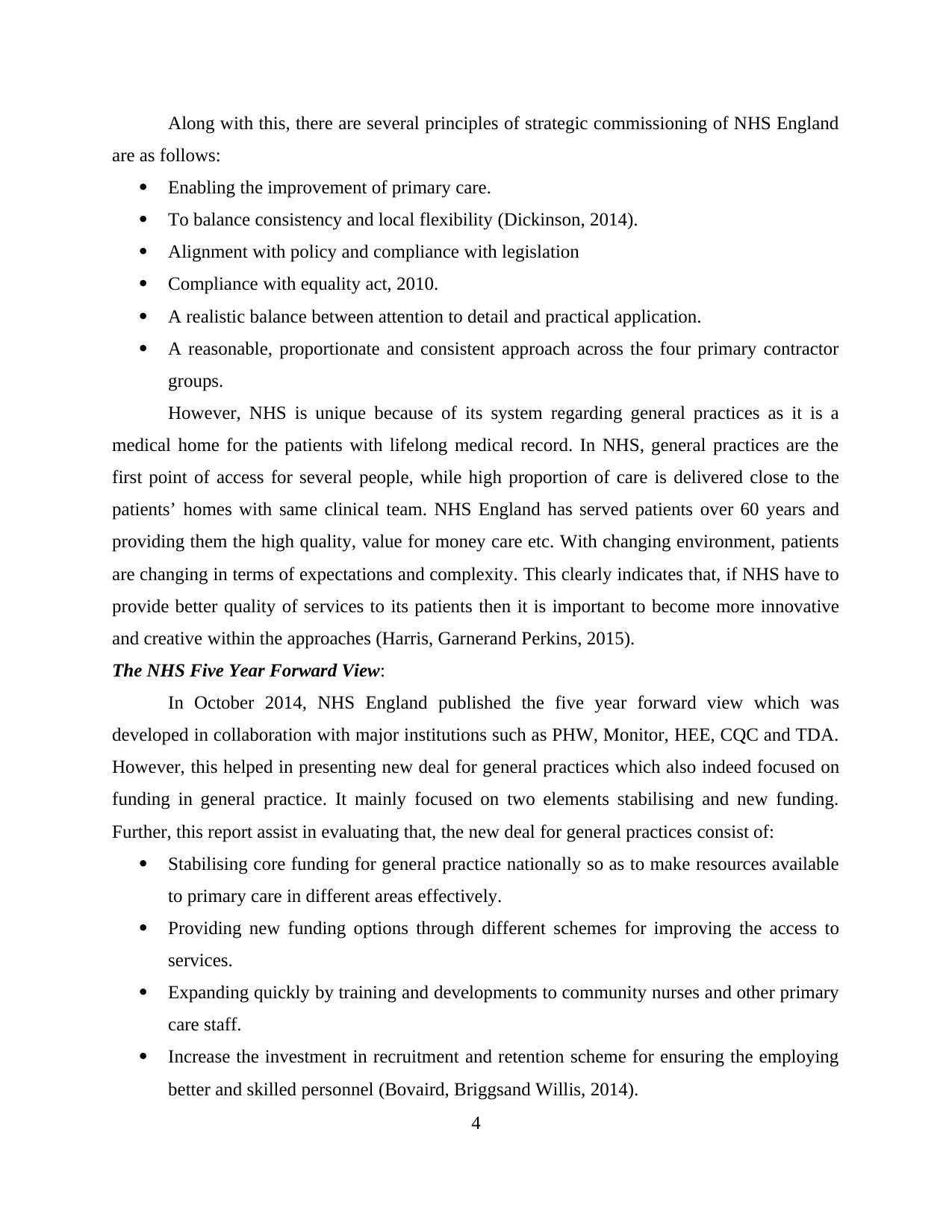
Along with this, there are several principles of strategic commissioning of NHS England
are as follows:
Enabling the improvement of primary care.
To balance consistency and local flexibility (Dickinson, 2014).
Alignment with policy and compliance with legislation
Compliance with equality act, 2010.
A realistic balance between attention to detail and practical application.
A reasonable, proportionate and consistent approach across the four primary contractor
groups.
However, NHS is unique because of its system regarding general practices as it is a
medical home for the patients with lifelong medical record. In NHS, general practices are the
first point of access for several people, while high proportion of care is delivered close to the
patients’ homes with same clinical team. NHS England has served patients over 60 years and
providing them the high quality, value for money care etc. With changing environment, patients
are changing in terms of expectations and complexity. This clearly indicates that, if NHS have to
provide better quality of services to its patients then it is important to become more innovative
and creative within the approaches (Harris, Garnerand Perkins, 2015).
The NHS Five Year Forward View:
In October 2014, NHS England published the five year forward view which was
developed in collaboration with major institutions such as PHW, Monitor, HEE, CQC and TDA.
However, this helped in presenting new deal for general practices which also indeed focused on
funding in general practice. It mainly focused on two elements stabilising and new funding.
Further, this report assist in evaluating that, the new deal for general practices consist of:
Stabilising core funding for general practice nationally so as to make resources available
to primary care in different areas effectively.
Providing new funding options through different schemes for improving the access to
services.
Expanding quickly by training and developments to community nurses and other primary
care staff.
Increase the investment in recruitment and retention scheme for ensuring the employing
better and skilled personnel (Bovaird, Briggsand Willis, 2014).
4
are as follows:
Enabling the improvement of primary care.
To balance consistency and local flexibility (Dickinson, 2014).
Alignment with policy and compliance with legislation
Compliance with equality act, 2010.
A realistic balance between attention to detail and practical application.
A reasonable, proportionate and consistent approach across the four primary contractor
groups.
However, NHS is unique because of its system regarding general practices as it is a
medical home for the patients with lifelong medical record. In NHS, general practices are the
first point of access for several people, while high proportion of care is delivered close to the
patients’ homes with same clinical team. NHS England has served patients over 60 years and
providing them the high quality, value for money care etc. With changing environment, patients
are changing in terms of expectations and complexity. This clearly indicates that, if NHS have to
provide better quality of services to its patients then it is important to become more innovative
and creative within the approaches (Harris, Garnerand Perkins, 2015).
The NHS Five Year Forward View:
In October 2014, NHS England published the five year forward view which was
developed in collaboration with major institutions such as PHW, Monitor, HEE, CQC and TDA.
However, this helped in presenting new deal for general practices which also indeed focused on
funding in general practice. It mainly focused on two elements stabilising and new funding.
Further, this report assist in evaluating that, the new deal for general practices consist of:
Stabilising core funding for general practice nationally so as to make resources available
to primary care in different areas effectively.
Providing new funding options through different schemes for improving the access to
services.
Expanding quickly by training and developments to community nurses and other primary
care staff.
Increase the investment in recruitment and retention scheme for ensuring the employing
better and skilled personnel (Bovaird, Briggsand Willis, 2014).
4
Paraphrase This Document
Need a fresh take? Get an instant paraphrase of this document with our AI Paraphraser
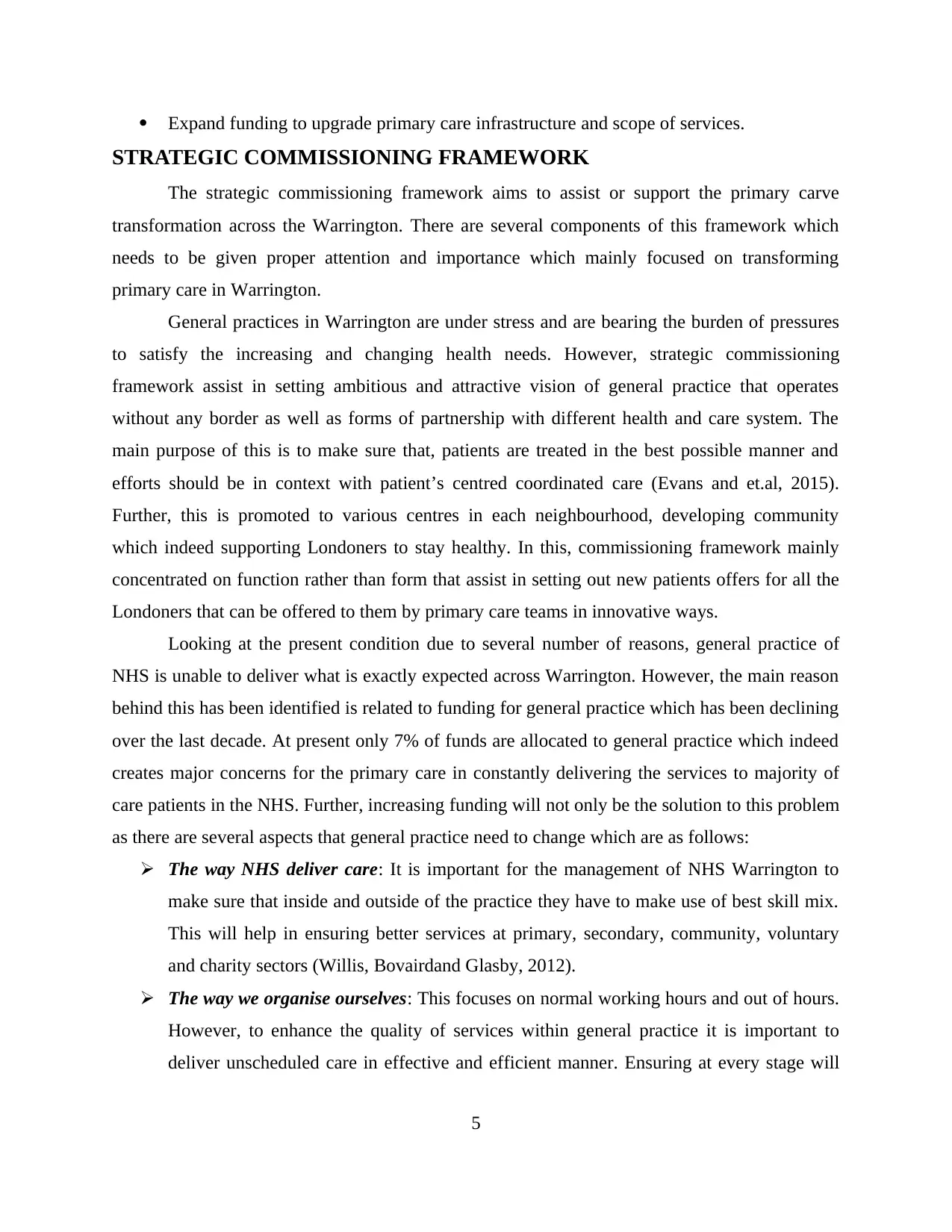
Expand funding to upgrade primary care infrastructure and scope of services.
STRATEGIC COMMISSIONING FRAMEWORK
The strategic commissioning framework aims to assist or support the primary carve
transformation across the Warrington. There are several components of this framework which
needs to be given proper attention and importance which mainly focused on transforming
primary care in Warrington.
General practices in Warrington are under stress and are bearing the burden of pressures
to satisfy the increasing and changing health needs. However, strategic commissioning
framework assist in setting ambitious and attractive vision of general practice that operates
without any border as well as forms of partnership with different health and care system. The
main purpose of this is to make sure that, patients are treated in the best possible manner and
efforts should be in context with patient’s centred coordinated care (Evans and et.al, 2015).
Further, this is promoted to various centres in each neighbourhood, developing community
which indeed supporting Londoners to stay healthy. In this, commissioning framework mainly
concentrated on function rather than form that assist in setting out new patients offers for all the
Londoners that can be offered to them by primary care teams in innovative ways.
Looking at the present condition due to several number of reasons, general practice of
NHS is unable to deliver what is exactly expected across Warrington. However, the main reason
behind this has been identified is related to funding for general practice which has been declining
over the last decade. At present only 7% of funds are allocated to general practice which indeed
creates major concerns for the primary care in constantly delivering the services to majority of
care patients in the NHS. Further, increasing funding will not only be the solution to this problem
as there are several aspects that general practice need to change which are as follows:
The way NHS deliver care: It is important for the management of NHS Warrington to
make sure that inside and outside of the practice they have to make use of best skill mix.
This will help in ensuring better services at primary, secondary, community, voluntary
and charity sectors (Willis, Bovairdand Glasby, 2012).
The way we organise ourselves: This focuses on normal working hours and out of hours.
However, to enhance the quality of services within general practice it is important to
deliver unscheduled care in effective and efficient manner. Ensuring at every stage will
5
STRATEGIC COMMISSIONING FRAMEWORK
The strategic commissioning framework aims to assist or support the primary carve
transformation across the Warrington. There are several components of this framework which
needs to be given proper attention and importance which mainly focused on transforming
primary care in Warrington.
General practices in Warrington are under stress and are bearing the burden of pressures
to satisfy the increasing and changing health needs. However, strategic commissioning
framework assist in setting ambitious and attractive vision of general practice that operates
without any border as well as forms of partnership with different health and care system. The
main purpose of this is to make sure that, patients are treated in the best possible manner and
efforts should be in context with patient’s centred coordinated care (Evans and et.al, 2015).
Further, this is promoted to various centres in each neighbourhood, developing community
which indeed supporting Londoners to stay healthy. In this, commissioning framework mainly
concentrated on function rather than form that assist in setting out new patients offers for all the
Londoners that can be offered to them by primary care teams in innovative ways.
Looking at the present condition due to several number of reasons, general practice of
NHS is unable to deliver what is exactly expected across Warrington. However, the main reason
behind this has been identified is related to funding for general practice which has been declining
over the last decade. At present only 7% of funds are allocated to general practice which indeed
creates major concerns for the primary care in constantly delivering the services to majority of
care patients in the NHS. Further, increasing funding will not only be the solution to this problem
as there are several aspects that general practice need to change which are as follows:
The way NHS deliver care: It is important for the management of NHS Warrington to
make sure that inside and outside of the practice they have to make use of best skill mix.
This will help in ensuring better services at primary, secondary, community, voluntary
and charity sectors (Willis, Bovairdand Glasby, 2012).
The way we organise ourselves: This focuses on normal working hours and out of hours.
However, to enhance the quality of services within general practice it is important to
deliver unscheduled care in effective and efficient manner. Ensuring at every stage will
5
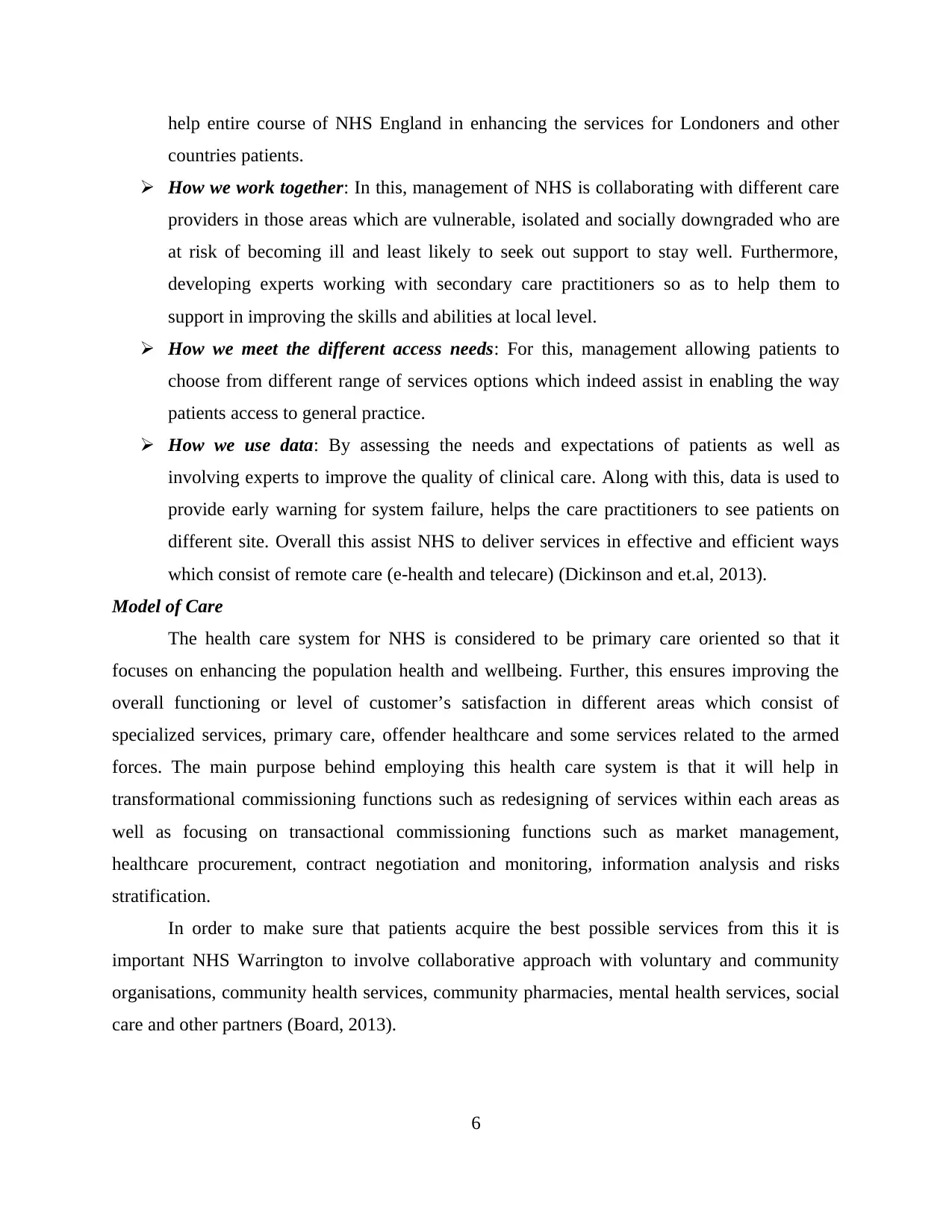
help entire course of NHS England in enhancing the services for Londoners and other
countries patients.
How we work together: In this, management of NHS is collaborating with different care
providers in those areas which are vulnerable, isolated and socially downgraded who are
at risk of becoming ill and least likely to seek out support to stay well. Furthermore,
developing experts working with secondary care practitioners so as to help them to
support in improving the skills and abilities at local level.
How we meet the different access needs: For this, management allowing patients to
choose from different range of services options which indeed assist in enabling the way
patients access to general practice.
How we use data: By assessing the needs and expectations of patients as well as
involving experts to improve the quality of clinical care. Along with this, data is used to
provide early warning for system failure, helps the care practitioners to see patients on
different site. Overall this assist NHS to deliver services in effective and efficient ways
which consist of remote care (e-health and telecare) (Dickinson and et.al, 2013).
Model of Care
The health care system for NHS is considered to be primary care oriented so that it
focuses on enhancing the population health and wellbeing. Further, this ensures improving the
overall functioning or level of customer’s satisfaction in different areas which consist of
specialized services, primary care, offender healthcare and some services related to the armed
forces. The main purpose behind employing this health care system is that it will help in
transformational commissioning functions such as redesigning of services within each areas as
well as focusing on transactional commissioning functions such as market management,
healthcare procurement, contract negotiation and monitoring, information analysis and risks
stratification.
In order to make sure that patients acquire the best possible services from this it is
important NHS Warrington to involve collaborative approach with voluntary and community
organisations, community health services, community pharmacies, mental health services, social
care and other partners (Board, 2013).
6
countries patients.
How we work together: In this, management of NHS is collaborating with different care
providers in those areas which are vulnerable, isolated and socially downgraded who are
at risk of becoming ill and least likely to seek out support to stay well. Furthermore,
developing experts working with secondary care practitioners so as to help them to
support in improving the skills and abilities at local level.
How we meet the different access needs: For this, management allowing patients to
choose from different range of services options which indeed assist in enabling the way
patients access to general practice.
How we use data: By assessing the needs and expectations of patients as well as
involving experts to improve the quality of clinical care. Along with this, data is used to
provide early warning for system failure, helps the care practitioners to see patients on
different site. Overall this assist NHS to deliver services in effective and efficient ways
which consist of remote care (e-health and telecare) (Dickinson and et.al, 2013).
Model of Care
The health care system for NHS is considered to be primary care oriented so that it
focuses on enhancing the population health and wellbeing. Further, this ensures improving the
overall functioning or level of customer’s satisfaction in different areas which consist of
specialized services, primary care, offender healthcare and some services related to the armed
forces. The main purpose behind employing this health care system is that it will help in
transformational commissioning functions such as redesigning of services within each areas as
well as focusing on transactional commissioning functions such as market management,
healthcare procurement, contract negotiation and monitoring, information analysis and risks
stratification.
In order to make sure that patients acquire the best possible services from this it is
important NHS Warrington to involve collaborative approach with voluntary and community
organisations, community health services, community pharmacies, mental health services, social
care and other partners (Board, 2013).
6
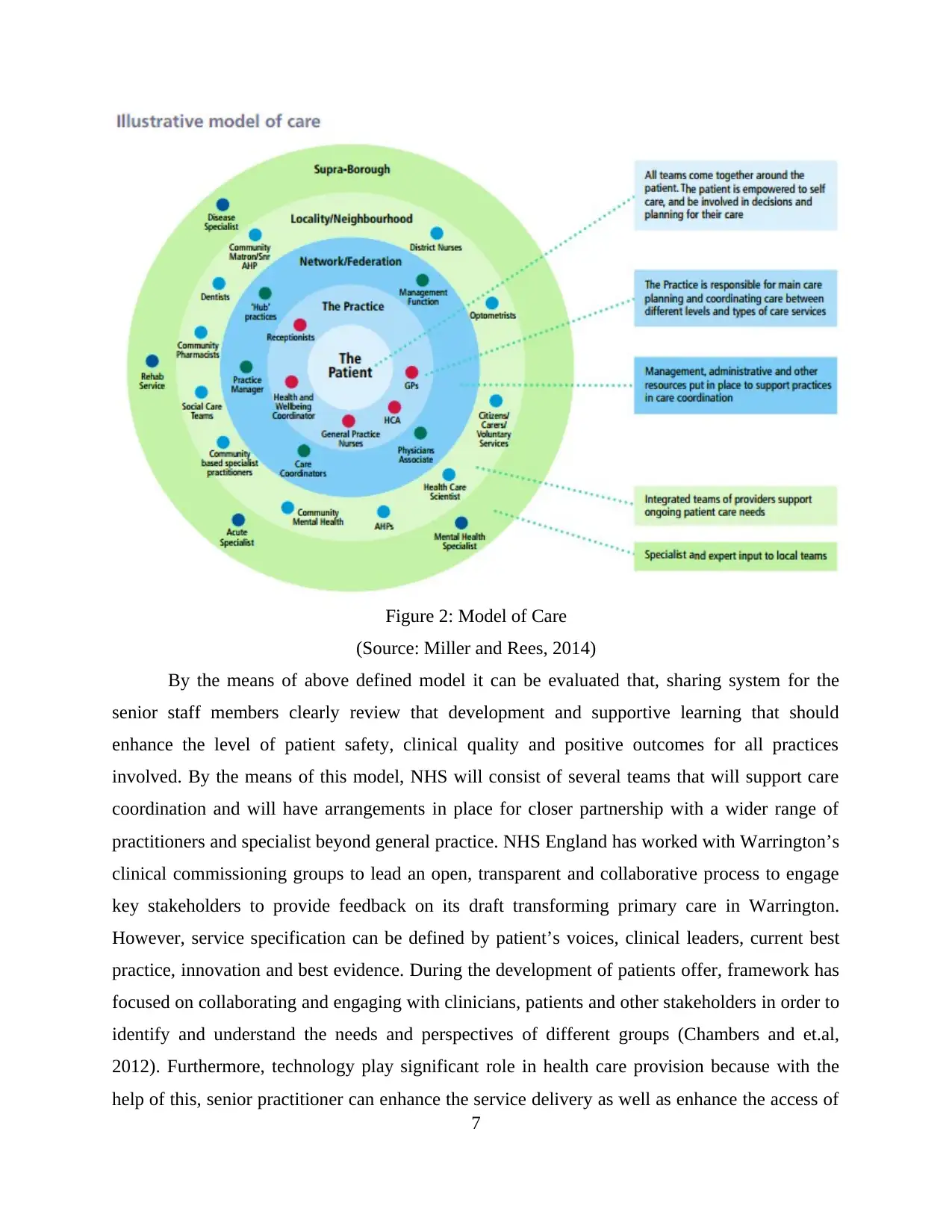
Figure 2: Model of Care
(Source: Miller and Rees, 2014)
By the means of above defined model it can be evaluated that, sharing system for the
senior staff members clearly review that development and supportive learning that should
enhance the level of patient safety, clinical quality and positive outcomes for all practices
involved. By the means of this model, NHS will consist of several teams that will support care
coordination and will have arrangements in place for closer partnership with a wider range of
practitioners and specialist beyond general practice. NHS England has worked with Warrington’s
clinical commissioning groups to lead an open, transparent and collaborative process to engage
key stakeholders to provide feedback on its draft transforming primary care in Warrington.
However, service specification can be defined by patient’s voices, clinical leaders, current best
practice, innovation and best evidence. During the development of patients offer, framework has
focused on collaborating and engaging with clinicians, patients and other stakeholders in order to
identify and understand the needs and perspectives of different groups (Chambers and et.al,
2012). Furthermore, technology play significant role in health care provision because with the
help of this, senior practitioner can enhance the service delivery as well as enhance the access of
7
(Source: Miller and Rees, 2014)
By the means of above defined model it can be evaluated that, sharing system for the
senior staff members clearly review that development and supportive learning that should
enhance the level of patient safety, clinical quality and positive outcomes for all practices
involved. By the means of this model, NHS will consist of several teams that will support care
coordination and will have arrangements in place for closer partnership with a wider range of
practitioners and specialist beyond general practice. NHS England has worked with Warrington’s
clinical commissioning groups to lead an open, transparent and collaborative process to engage
key stakeholders to provide feedback on its draft transforming primary care in Warrington.
However, service specification can be defined by patient’s voices, clinical leaders, current best
practice, innovation and best evidence. During the development of patients offer, framework has
focused on collaborating and engaging with clinicians, patients and other stakeholders in order to
identify and understand the needs and perspectives of different groups (Chambers and et.al,
2012). Furthermore, technology play significant role in health care provision because with the
help of this, senior practitioner can enhance the service delivery as well as enhance the access of
7
Secure Best Marks with AI Grader
Need help grading? Try our AI Grader for instant feedback on your assignments.
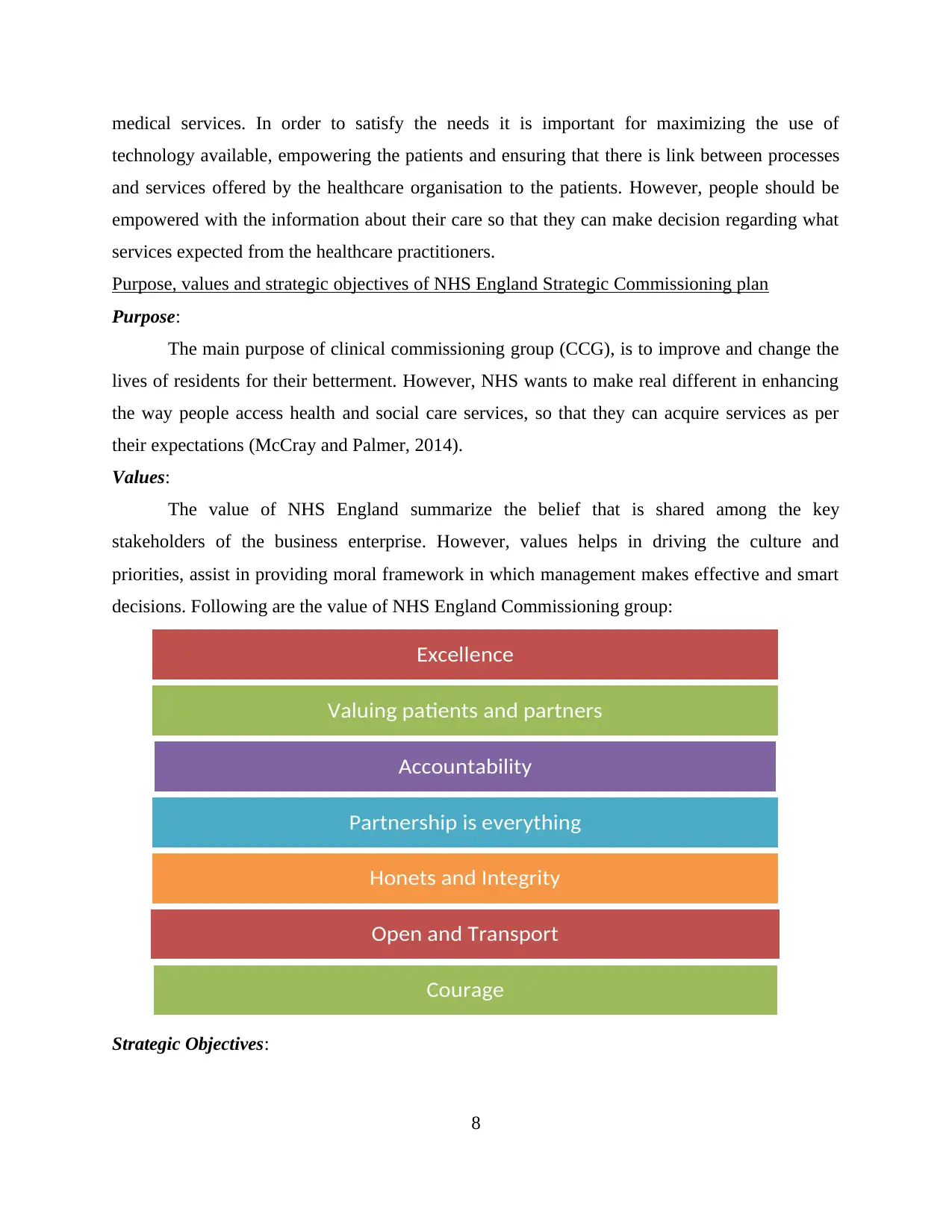
medical services. In order to satisfy the needs it is important for maximizing the use of
technology available, empowering the patients and ensuring that there is link between processes
and services offered by the healthcare organisation to the patients. However, people should be
empowered with the information about their care so that they can make decision regarding what
services expected from the healthcare practitioners.
Purpose, values and strategic objectives of NHS England Strategic Commissioning plan
Purpose:
The main purpose of clinical commissioning group (CCG), is to improve and change the
lives of residents for their betterment. However, NHS wants to make real different in enhancing
the way people access health and social care services, so that they can acquire services as per
their expectations (McCray and Palmer, 2014).
Values:
The value of NHS England summarize the belief that is shared among the key
stakeholders of the business enterprise. However, values helps in driving the culture and
priorities, assist in providing moral framework in which management makes effective and smart
decisions. Following are the value of NHS England Commissioning group:
Strategic Objectives:
8
Excellence
Valuing patients and partners
Accountability
Partnership is everything
Honets and Integrity
Open and Transport
Courage
technology available, empowering the patients and ensuring that there is link between processes
and services offered by the healthcare organisation to the patients. However, people should be
empowered with the information about their care so that they can make decision regarding what
services expected from the healthcare practitioners.
Purpose, values and strategic objectives of NHS England Strategic Commissioning plan
Purpose:
The main purpose of clinical commissioning group (CCG), is to improve and change the
lives of residents for their betterment. However, NHS wants to make real different in enhancing
the way people access health and social care services, so that they can acquire services as per
their expectations (McCray and Palmer, 2014).
Values:
The value of NHS England summarize the belief that is shared among the key
stakeholders of the business enterprise. However, values helps in driving the culture and
priorities, assist in providing moral framework in which management makes effective and smart
decisions. Following are the value of NHS England Commissioning group:
Strategic Objectives:
8
Excellence
Valuing patients and partners
Accountability
Partnership is everything
Honets and Integrity
Open and Transport
Courage
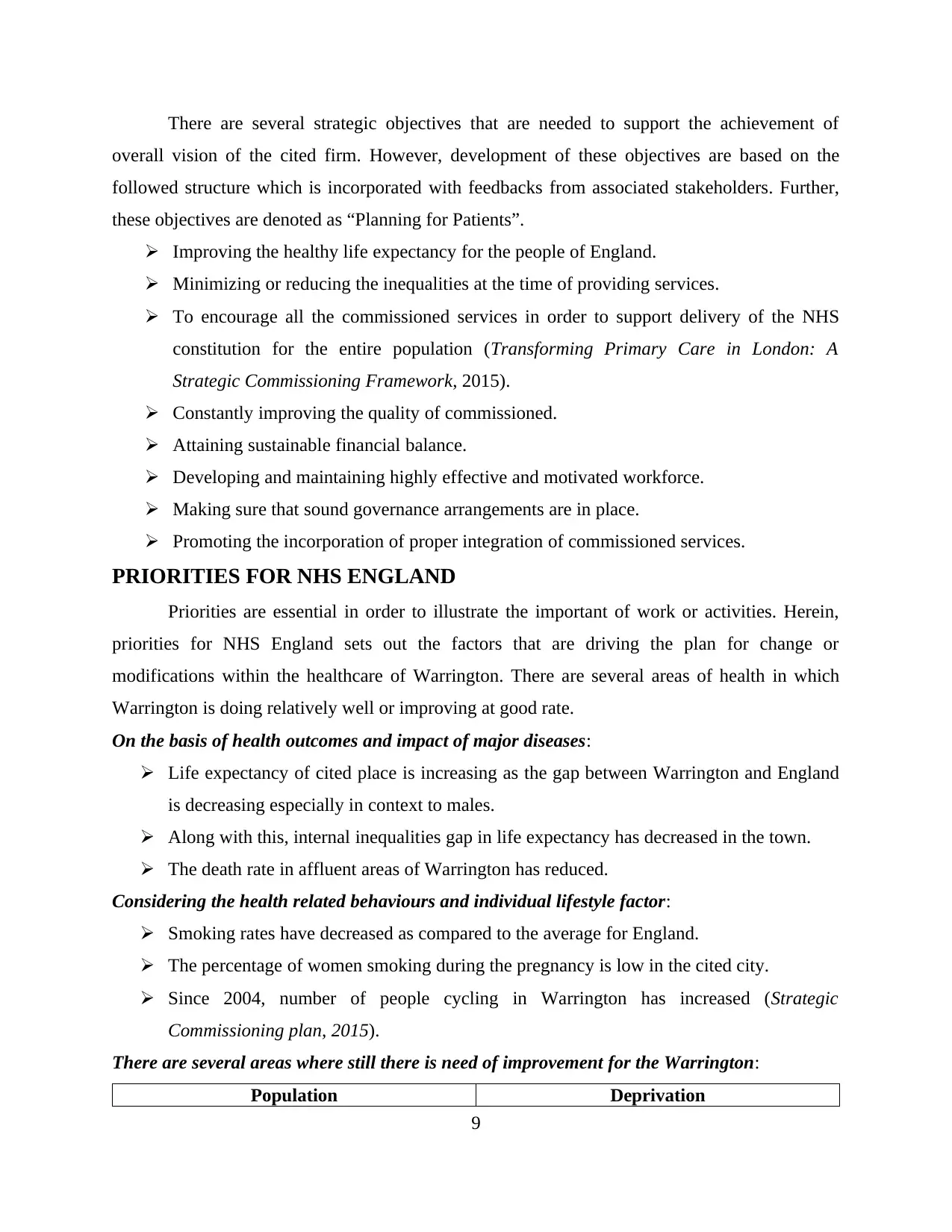
There are several strategic objectives that are needed to support the achievement of
overall vision of the cited firm. However, development of these objectives are based on the
followed structure which is incorporated with feedbacks from associated stakeholders. Further,
these objectives are denoted as “Planning for Patients”.
Improving the healthy life expectancy for the people of England.
Minimizing or reducing the inequalities at the time of providing services.
To encourage all the commissioned services in order to support delivery of the NHS
constitution for the entire population (Transforming Primary Care in London: A
Strategic Commissioning Framework, 2015).
Constantly improving the quality of commissioned.
Attaining sustainable financial balance.
Developing and maintaining highly effective and motivated workforce.
Making sure that sound governance arrangements are in place.
Promoting the incorporation of proper integration of commissioned services.
PRIORITIES FOR NHS ENGLAND
Priorities are essential in order to illustrate the important of work or activities. Herein,
priorities for NHS England sets out the factors that are driving the plan for change or
modifications within the healthcare of Warrington. There are several areas of health in which
Warrington is doing relatively well or improving at good rate.
On the basis of health outcomes and impact of major diseases:
Life expectancy of cited place is increasing as the gap between Warrington and England
is decreasing especially in context to males.
Along with this, internal inequalities gap in life expectancy has decreased in the town.
The death rate in affluent areas of Warrington has reduced.
Considering the health related behaviours and individual lifestyle factor:
Smoking rates have decreased as compared to the average for England.
The percentage of women smoking during the pregnancy is low in the cited city.
Since 2004, number of people cycling in Warrington has increased (Strategic
Commissioning plan, 2015).
There are several areas where still there is need of improvement for the Warrington:
Population Deprivation
9
overall vision of the cited firm. However, development of these objectives are based on the
followed structure which is incorporated with feedbacks from associated stakeholders. Further,
these objectives are denoted as “Planning for Patients”.
Improving the healthy life expectancy for the people of England.
Minimizing or reducing the inequalities at the time of providing services.
To encourage all the commissioned services in order to support delivery of the NHS
constitution for the entire population (Transforming Primary Care in London: A
Strategic Commissioning Framework, 2015).
Constantly improving the quality of commissioned.
Attaining sustainable financial balance.
Developing and maintaining highly effective and motivated workforce.
Making sure that sound governance arrangements are in place.
Promoting the incorporation of proper integration of commissioned services.
PRIORITIES FOR NHS ENGLAND
Priorities are essential in order to illustrate the important of work or activities. Herein,
priorities for NHS England sets out the factors that are driving the plan for change or
modifications within the healthcare of Warrington. There are several areas of health in which
Warrington is doing relatively well or improving at good rate.
On the basis of health outcomes and impact of major diseases:
Life expectancy of cited place is increasing as the gap between Warrington and England
is decreasing especially in context to males.
Along with this, internal inequalities gap in life expectancy has decreased in the town.
The death rate in affluent areas of Warrington has reduced.
Considering the health related behaviours and individual lifestyle factor:
Smoking rates have decreased as compared to the average for England.
The percentage of women smoking during the pregnancy is low in the cited city.
Since 2004, number of people cycling in Warrington has increased (Strategic
Commissioning plan, 2015).
There are several areas where still there is need of improvement for the Warrington:
Population Deprivation
9
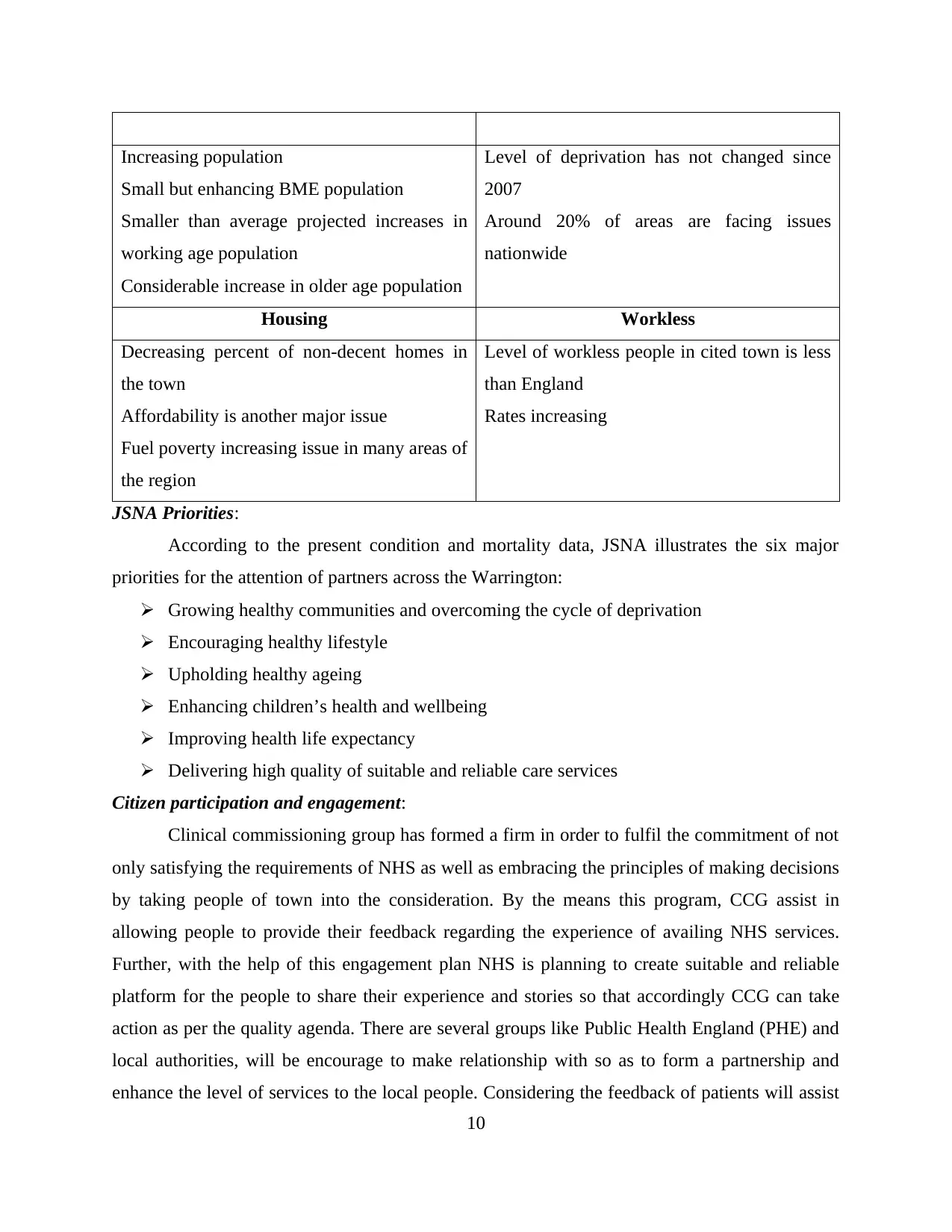
Increasing population
Small but enhancing BME population
Smaller than average projected increases in
working age population
Considerable increase in older age population
Level of deprivation has not changed since
2007
Around 20% of areas are facing issues
nationwide
Housing Workless
Decreasing percent of non-decent homes in
the town
Affordability is another major issue
Fuel poverty increasing issue in many areas of
the region
Level of workless people in cited town is less
than England
Rates increasing
JSNA Priorities:
According to the present condition and mortality data, JSNA illustrates the six major
priorities for the attention of partners across the Warrington:
Growing healthy communities and overcoming the cycle of deprivation
Encouraging healthy lifestyle
Upholding healthy ageing
Enhancing children’s health and wellbeing
Improving health life expectancy
Delivering high quality of suitable and reliable care services
Citizen participation and engagement:
Clinical commissioning group has formed a firm in order to fulfil the commitment of not
only satisfying the requirements of NHS as well as embracing the principles of making decisions
by taking people of town into the consideration. By the means this program, CCG assist in
allowing people to provide their feedback regarding the experience of availing NHS services.
Further, with the help of this engagement plan NHS is planning to create suitable and reliable
platform for the people to share their experience and stories so that accordingly CCG can take
action as per the quality agenda. There are several groups like Public Health England (PHE) and
local authorities, will be encourage to make relationship with so as to form a partnership and
enhance the level of services to the local people. Considering the feedback of patients will assist
10
Small but enhancing BME population
Smaller than average projected increases in
working age population
Considerable increase in older age population
Level of deprivation has not changed since
2007
Around 20% of areas are facing issues
nationwide
Housing Workless
Decreasing percent of non-decent homes in
the town
Affordability is another major issue
Fuel poverty increasing issue in many areas of
the region
Level of workless people in cited town is less
than England
Rates increasing
JSNA Priorities:
According to the present condition and mortality data, JSNA illustrates the six major
priorities for the attention of partners across the Warrington:
Growing healthy communities and overcoming the cycle of deprivation
Encouraging healthy lifestyle
Upholding healthy ageing
Enhancing children’s health and wellbeing
Improving health life expectancy
Delivering high quality of suitable and reliable care services
Citizen participation and engagement:
Clinical commissioning group has formed a firm in order to fulfil the commitment of not
only satisfying the requirements of NHS as well as embracing the principles of making decisions
by taking people of town into the consideration. By the means this program, CCG assist in
allowing people to provide their feedback regarding the experience of availing NHS services.
Further, with the help of this engagement plan NHS is planning to create suitable and reliable
platform for the people to share their experience and stories so that accordingly CCG can take
action as per the quality agenda. There are several groups like Public Health England (PHE) and
local authorities, will be encourage to make relationship with so as to form a partnership and
enhance the level of services to the local people. Considering the feedback of patients will assist
10
Paraphrase This Document
Need a fresh take? Get an instant paraphrase of this document with our AI Paraphraser
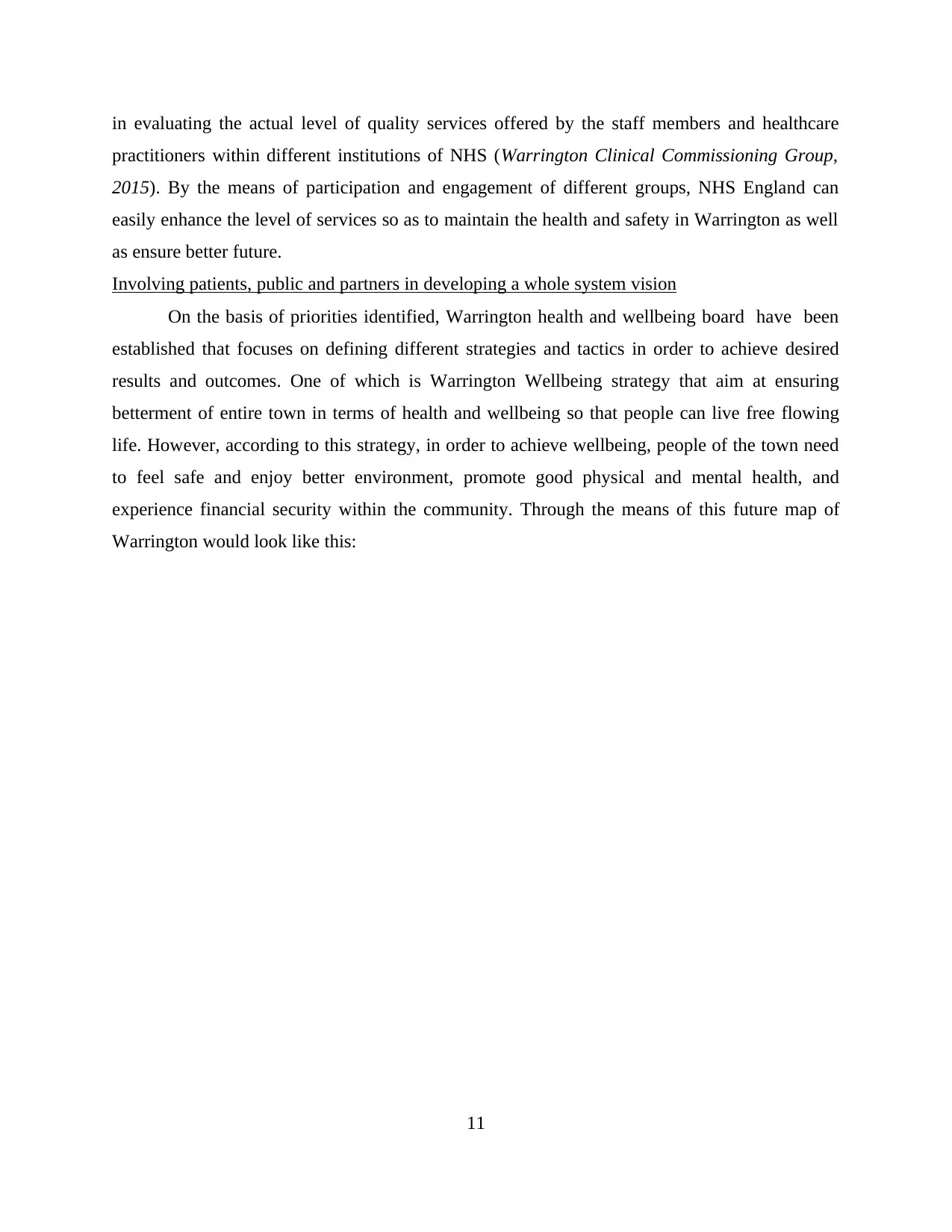
in evaluating the actual level of quality services offered by the staff members and healthcare
practitioners within different institutions of NHS (Warrington Clinical Commissioning Group,
2015). By the means of participation and engagement of different groups, NHS England can
easily enhance the level of services so as to maintain the health and safety in Warrington as well
as ensure better future.
Involving patients, public and partners in developing a whole system vision
On the basis of priorities identified, Warrington health and wellbeing board have been
established that focuses on defining different strategies and tactics in order to achieve desired
results and outcomes. One of which is Warrington Wellbeing strategy that aim at ensuring
betterment of entire town in terms of health and wellbeing so that people can live free flowing
life. However, according to this strategy, in order to achieve wellbeing, people of the town need
to feel safe and enjoy better environment, promote good physical and mental health, and
experience financial security within the community. Through the means of this future map of
Warrington would look like this:
11
practitioners within different institutions of NHS (Warrington Clinical Commissioning Group,
2015). By the means of participation and engagement of different groups, NHS England can
easily enhance the level of services so as to maintain the health and safety in Warrington as well
as ensure better future.
Involving patients, public and partners in developing a whole system vision
On the basis of priorities identified, Warrington health and wellbeing board have been
established that focuses on defining different strategies and tactics in order to achieve desired
results and outcomes. One of which is Warrington Wellbeing strategy that aim at ensuring
betterment of entire town in terms of health and wellbeing so that people can live free flowing
life. However, according to this strategy, in order to achieve wellbeing, people of the town need
to feel safe and enjoy better environment, promote good physical and mental health, and
experience financial security within the community. Through the means of this future map of
Warrington would look like this:
11
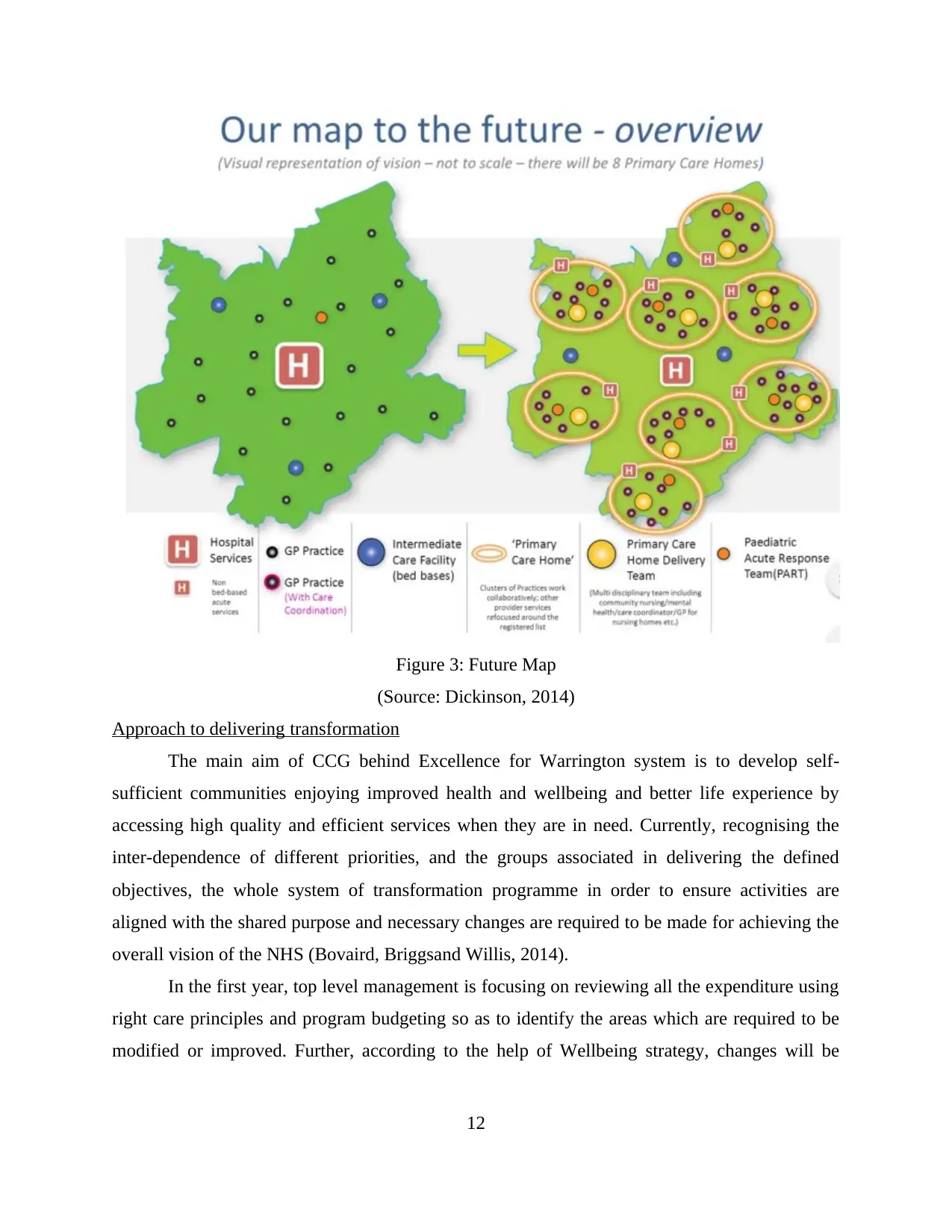
Figure 3: Future Map
(Source: Dickinson, 2014)
Approach to delivering transformation
The main aim of CCG behind Excellence for Warrington system is to develop self-
sufficient communities enjoying improved health and wellbeing and better life experience by
accessing high quality and efficient services when they are in need. Currently, recognising the
inter-dependence of different priorities, and the groups associated in delivering the defined
objectives, the whole system of transformation programme in order to ensure activities are
aligned with the shared purpose and necessary changes are required to be made for achieving the
overall vision of the NHS (Bovaird, Briggsand Willis, 2014).
In the first year, top level management is focusing on reviewing all the expenditure using
right care principles and program budgeting so as to identify the areas which are required to be
modified or improved. Further, according to the help of Wellbeing strategy, changes will be
12
(Source: Dickinson, 2014)
Approach to delivering transformation
The main aim of CCG behind Excellence for Warrington system is to develop self-
sufficient communities enjoying improved health and wellbeing and better life experience by
accessing high quality and efficient services when they are in need. Currently, recognising the
inter-dependence of different priorities, and the groups associated in delivering the defined
objectives, the whole system of transformation programme in order to ensure activities are
aligned with the shared purpose and necessary changes are required to be made for achieving the
overall vision of the NHS (Bovaird, Briggsand Willis, 2014).
In the first year, top level management is focusing on reviewing all the expenditure using
right care principles and program budgeting so as to identify the areas which are required to be
modified or improved. Further, according to the help of Wellbeing strategy, changes will be
12
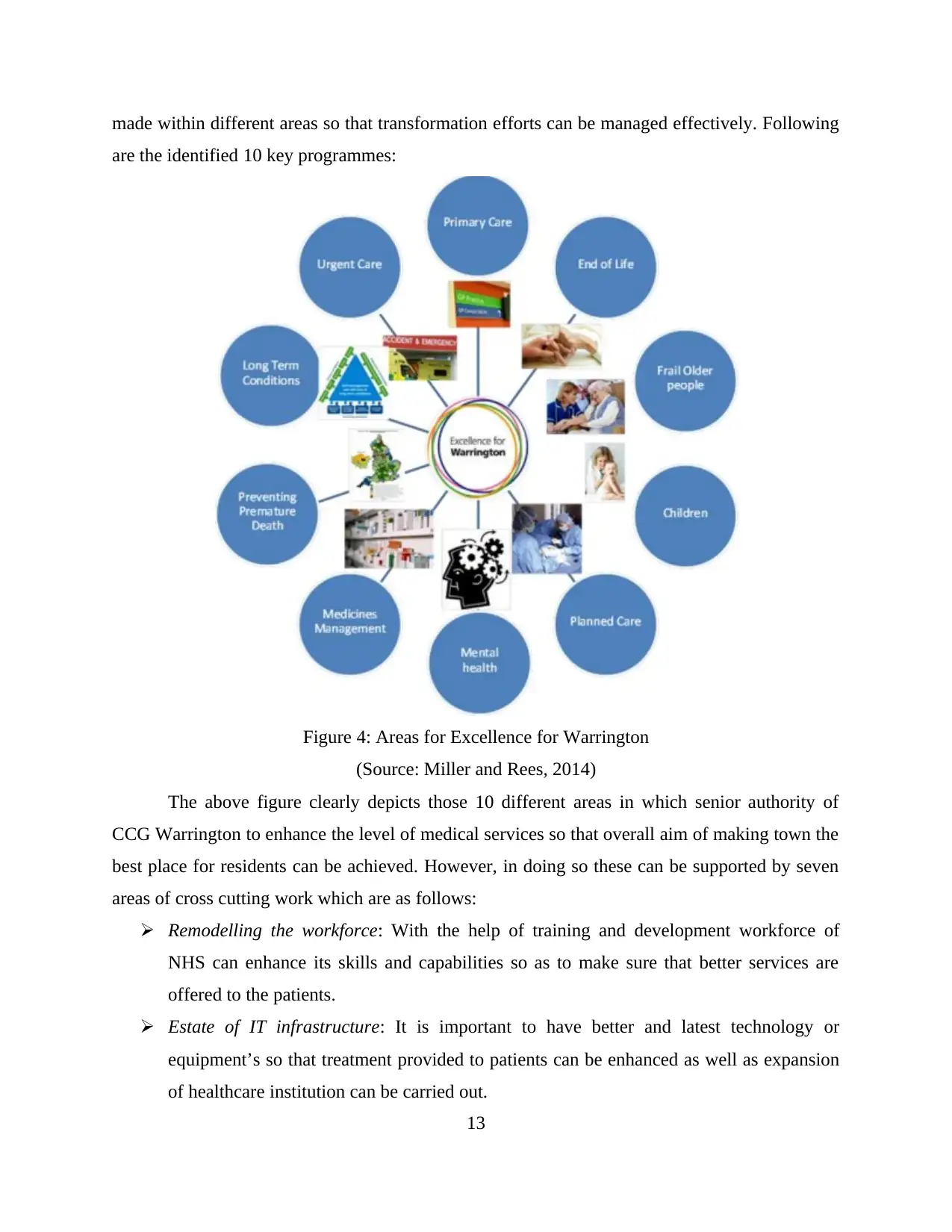
made within different areas so that transformation efforts can be managed effectively. Following
are the identified 10 key programmes:
Figure 4: Areas for Excellence for Warrington
(Source: Miller and Rees, 2014)
The above figure clearly depicts those 10 different areas in which senior authority of
CCG Warrington to enhance the level of medical services so that overall aim of making town the
best place for residents can be achieved. However, in doing so these can be supported by seven
areas of cross cutting work which are as follows:
Remodelling the workforce: With the help of training and development workforce of
NHS can enhance its skills and capabilities so as to make sure that better services are
offered to the patients.
Estate of IT infrastructure: It is important to have better and latest technology or
equipment’s so that treatment provided to patients can be enhanced as well as expansion
of healthcare institution can be carried out.
13
are the identified 10 key programmes:
Figure 4: Areas for Excellence for Warrington
(Source: Miller and Rees, 2014)
The above figure clearly depicts those 10 different areas in which senior authority of
CCG Warrington to enhance the level of medical services so that overall aim of making town the
best place for residents can be achieved. However, in doing so these can be supported by seven
areas of cross cutting work which are as follows:
Remodelling the workforce: With the help of training and development workforce of
NHS can enhance its skills and capabilities so as to make sure that better services are
offered to the patients.
Estate of IT infrastructure: It is important to have better and latest technology or
equipment’s so that treatment provided to patients can be enhanced as well as expansion
of healthcare institution can be carried out.
13
Secure Best Marks with AI Grader
Need help grading? Try our AI Grader for instant feedback on your assignments.
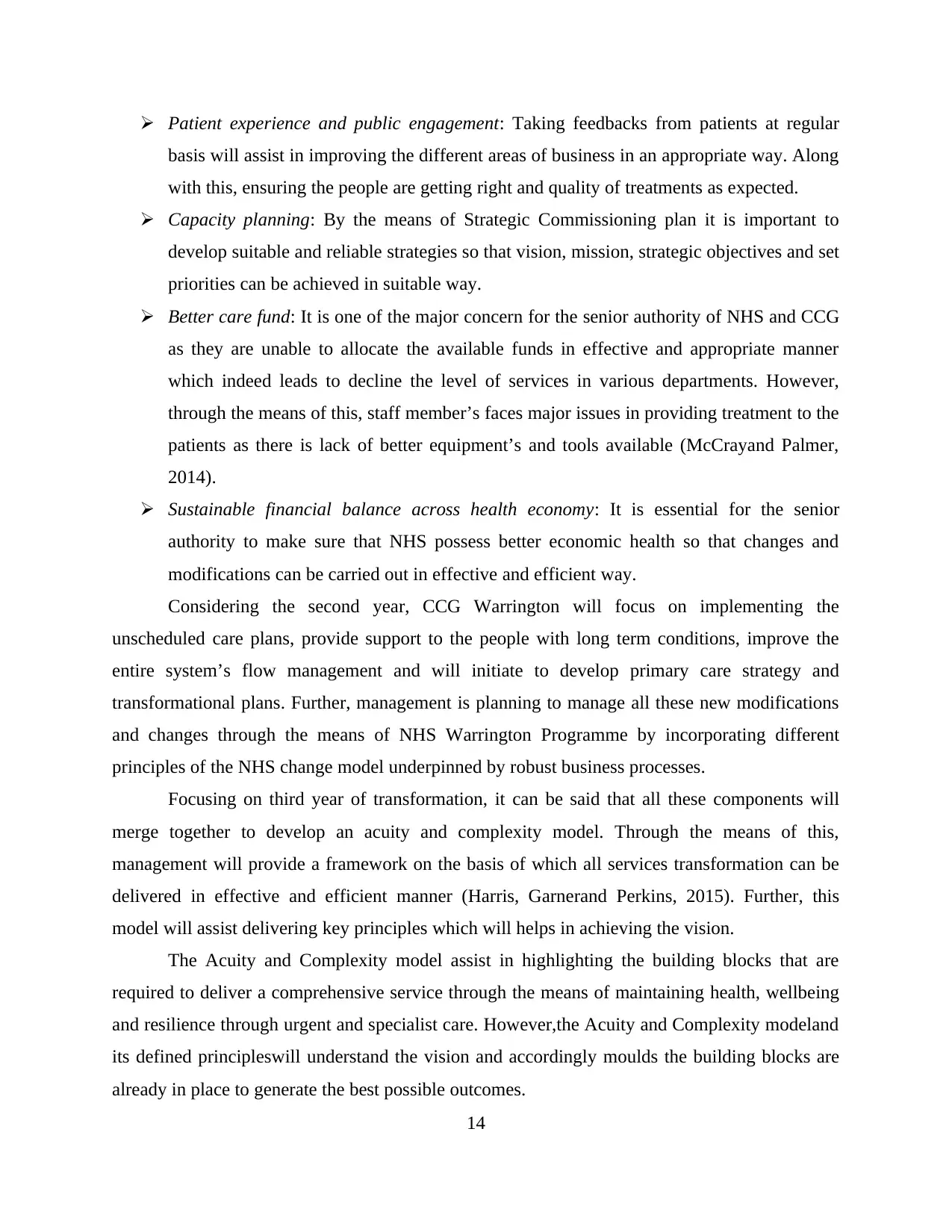
Patient experience and public engagement: Taking feedbacks from patients at regular
basis will assist in improving the different areas of business in an appropriate way. Along
with this, ensuring the people are getting right and quality of treatments as expected.
Capacity planning: By the means of Strategic Commissioning plan it is important to
develop suitable and reliable strategies so that vision, mission, strategic objectives and set
priorities can be achieved in suitable way.
Better care fund: It is one of the major concern for the senior authority of NHS and CCG
as they are unable to allocate the available funds in effective and appropriate manner
which indeed leads to decline the level of services in various departments. However,
through the means of this, staff member’s faces major issues in providing treatment to the
patients as there is lack of better equipment’s and tools available (McCrayand Palmer,
2014).
Sustainable financial balance across health economy: It is essential for the senior
authority to make sure that NHS possess better economic health so that changes and
modifications can be carried out in effective and efficient way.
Considering the second year, CCG Warrington will focus on implementing the
unscheduled care plans, provide support to the people with long term conditions, improve the
entire system’s flow management and will initiate to develop primary care strategy and
transformational plans. Further, management is planning to manage all these new modifications
and changes through the means of NHS Warrington Programme by incorporating different
principles of the NHS change model underpinned by robust business processes.
Focusing on third year of transformation, it can be said that all these components will
merge together to develop an acuity and complexity model. Through the means of this,
management will provide a framework on the basis of which all services transformation can be
delivered in effective and efficient manner (Harris, Garnerand Perkins, 2015). Further, this
model will assist delivering key principles which will helps in achieving the vision.
The Acuity and Complexity model assist in highlighting the building blocks that are
required to deliver a comprehensive service through the means of maintaining health, wellbeing
and resilience through urgent and specialist care. However,the Acuity and Complexity modeland
its defined principleswill understand the vision and accordingly moulds the building blocks are
already in place to generate the best possible outcomes.
14
basis will assist in improving the different areas of business in an appropriate way. Along
with this, ensuring the people are getting right and quality of treatments as expected.
Capacity planning: By the means of Strategic Commissioning plan it is important to
develop suitable and reliable strategies so that vision, mission, strategic objectives and set
priorities can be achieved in suitable way.
Better care fund: It is one of the major concern for the senior authority of NHS and CCG
as they are unable to allocate the available funds in effective and appropriate manner
which indeed leads to decline the level of services in various departments. However,
through the means of this, staff member’s faces major issues in providing treatment to the
patients as there is lack of better equipment’s and tools available (McCrayand Palmer,
2014).
Sustainable financial balance across health economy: It is essential for the senior
authority to make sure that NHS possess better economic health so that changes and
modifications can be carried out in effective and efficient way.
Considering the second year, CCG Warrington will focus on implementing the
unscheduled care plans, provide support to the people with long term conditions, improve the
entire system’s flow management and will initiate to develop primary care strategy and
transformational plans. Further, management is planning to manage all these new modifications
and changes through the means of NHS Warrington Programme by incorporating different
principles of the NHS change model underpinned by robust business processes.
Focusing on third year of transformation, it can be said that all these components will
merge together to develop an acuity and complexity model. Through the means of this,
management will provide a framework on the basis of which all services transformation can be
delivered in effective and efficient manner (Harris, Garnerand Perkins, 2015). Further, this
model will assist delivering key principles which will helps in achieving the vision.
The Acuity and Complexity model assist in highlighting the building blocks that are
required to deliver a comprehensive service through the means of maintaining health, wellbeing
and resilience through urgent and specialist care. However,the Acuity and Complexity modeland
its defined principleswill understand the vision and accordingly moulds the building blocks are
already in place to generate the best possible outcomes.
14
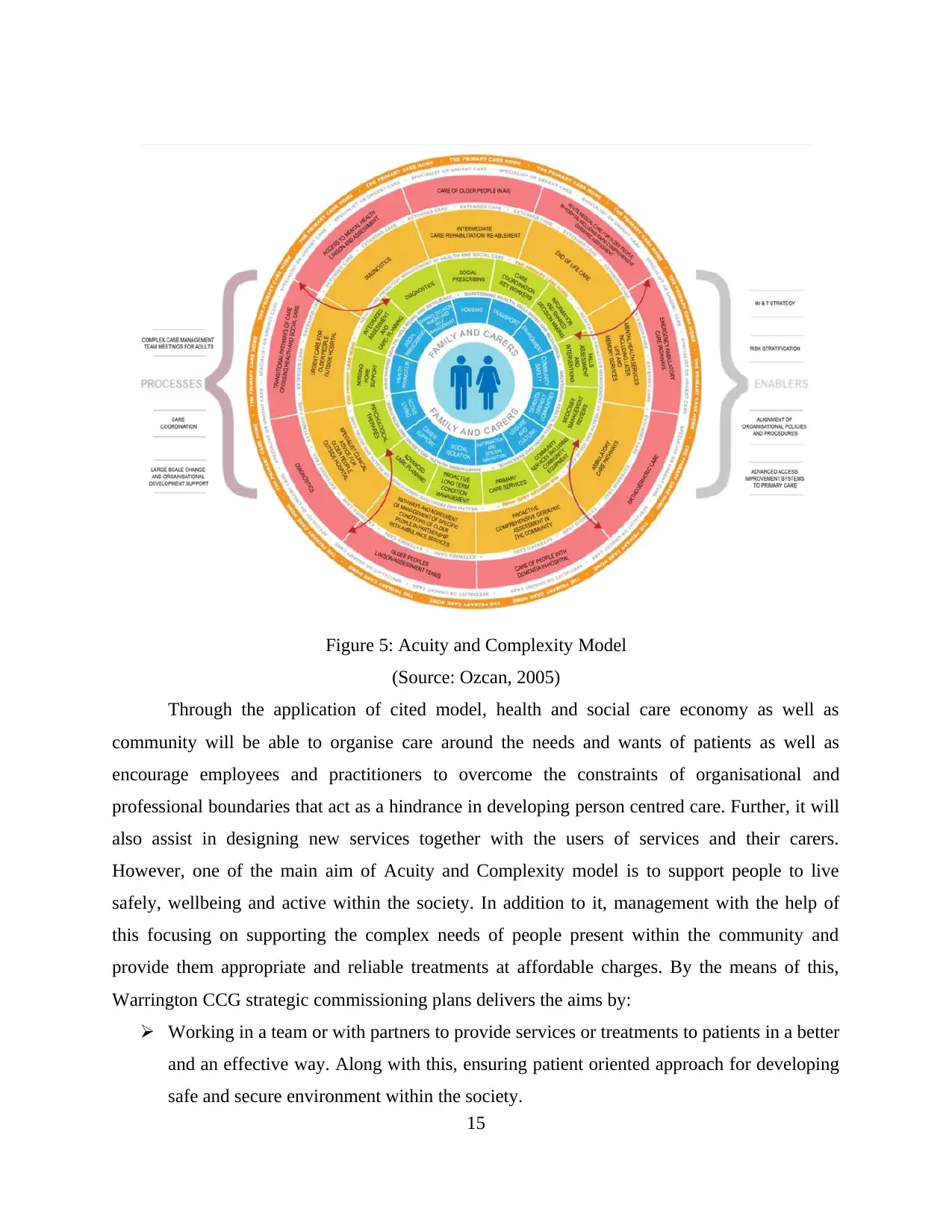
Figure 5: Acuity and Complexity Model
(Source: Ozcan, 2005)
Through the application of cited model, health and social care economy as well as
community will be able to organise care around the needs and wants of patients as well as
encourage employees and practitioners to overcome the constraints of organisational and
professional boundaries that act as a hindrance in developing person centred care. Further, it will
also assist in designing new services together with the users of services and their carers.
However, one of the main aim of Acuity and Complexity model is to support people to live
safely, wellbeing and active within the society. In addition to it, management with the help of
this focusing on supporting the complex needs of people present within the community and
provide them appropriate and reliable treatments at affordable charges. By the means of this,
Warrington CCG strategic commissioning plans delivers the aims by:
Working in a team or with partners to provide services or treatments to patients in a better
and an effective way. Along with this, ensuring patient oriented approach for developing
safe and secure environment within the society.
15
(Source: Ozcan, 2005)
Through the application of cited model, health and social care economy as well as
community will be able to organise care around the needs and wants of patients as well as
encourage employees and practitioners to overcome the constraints of organisational and
professional boundaries that act as a hindrance in developing person centred care. Further, it will
also assist in designing new services together with the users of services and their carers.
However, one of the main aim of Acuity and Complexity model is to support people to live
safely, wellbeing and active within the society. In addition to it, management with the help of
this focusing on supporting the complex needs of people present within the community and
provide them appropriate and reliable treatments at affordable charges. By the means of this,
Warrington CCG strategic commissioning plans delivers the aims by:
Working in a team or with partners to provide services or treatments to patients in a better
and an effective way. Along with this, ensuring patient oriented approach for developing
safe and secure environment within the society.
15
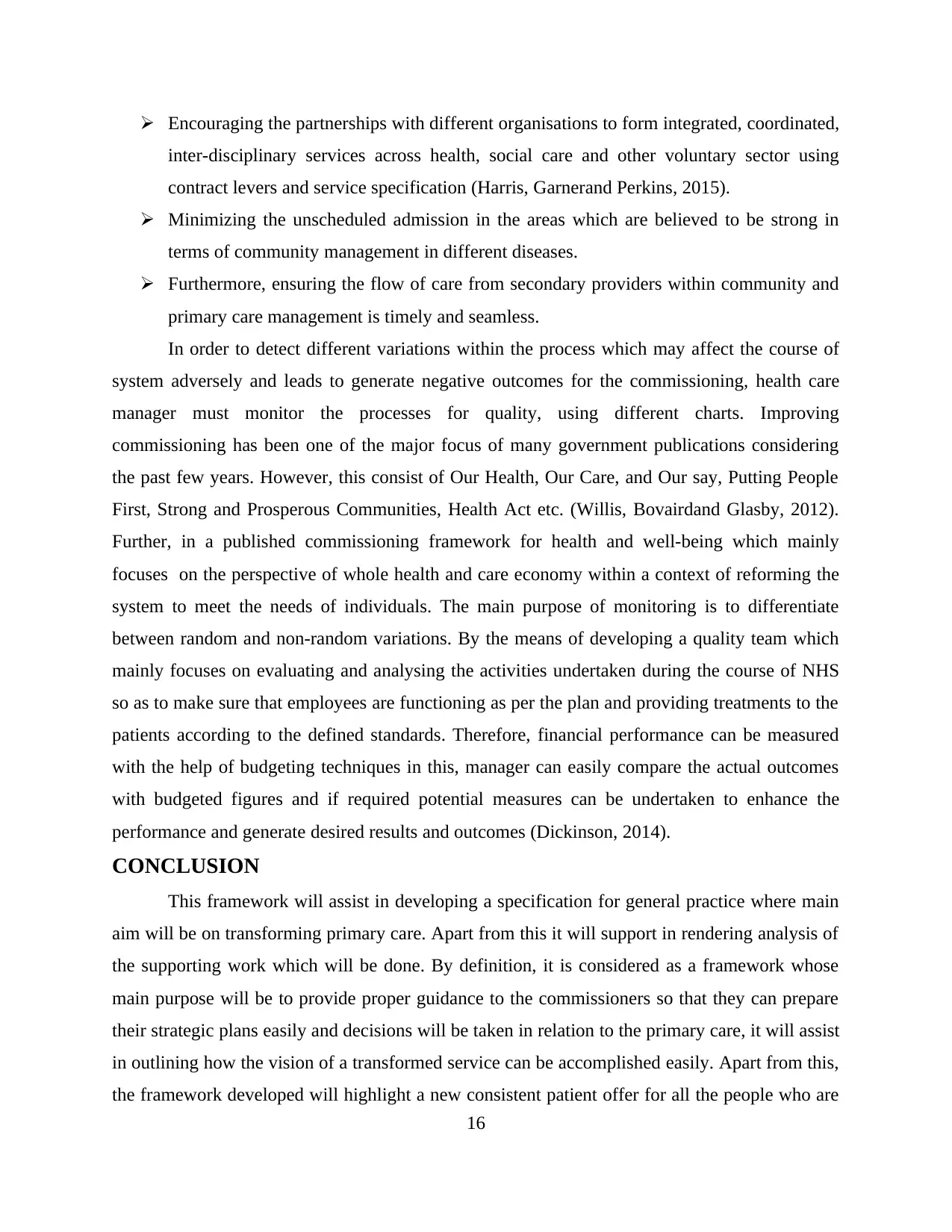
Encouraging the partnerships with different organisations to form integrated, coordinated,
inter-disciplinary services across health, social care and other voluntary sector using
contract levers and service specification (Harris, Garnerand Perkins, 2015).
Minimizing the unscheduled admission in the areas which are believed to be strong in
terms of community management in different diseases.
Furthermore, ensuring the flow of care from secondary providers within community and
primary care management is timely and seamless.
In order to detect different variations within the process which may affect the course of
system adversely and leads to generate negative outcomes for the commissioning, health care
manager must monitor the processes for quality, using different charts. Improving
commissioning has been one of the major focus of many government publications considering
the past few years. However, this consist of Our Health, Our Care, and Our say, Putting People
First, Strong and Prosperous Communities, Health Act etc. (Willis, Bovairdand Glasby, 2012).
Further, in a published commissioning framework for health and well-being which mainly
focuses on the perspective of whole health and care economy within a context of reforming the
system to meet the needs of individuals. The main purpose of monitoring is to differentiate
between random and non-random variations. By the means of developing a quality team which
mainly focuses on evaluating and analysing the activities undertaken during the course of NHS
so as to make sure that employees are functioning as per the plan and providing treatments to the
patients according to the defined standards. Therefore, financial performance can be measured
with the help of budgeting techniques in this, manager can easily compare the actual outcomes
with budgeted figures and if required potential measures can be undertaken to enhance the
performance and generate desired results and outcomes (Dickinson, 2014).
CONCLUSION
This framework will assist in developing a specification for general practice where main
aim will be on transforming primary care. Apart from this it will support in rendering analysis of
the supporting work which will be done. By definition, it is considered as a framework whose
main purpose will be to provide proper guidance to the commissioners so that they can prepare
their strategic plans easily and decisions will be taken in relation to the primary care, it will assist
in outlining how the vision of a transformed service can be accomplished easily. Apart from this,
the framework developed will highlight a new consistent patient offer for all the people who are
16
inter-disciplinary services across health, social care and other voluntary sector using
contract levers and service specification (Harris, Garnerand Perkins, 2015).
Minimizing the unscheduled admission in the areas which are believed to be strong in
terms of community management in different diseases.
Furthermore, ensuring the flow of care from secondary providers within community and
primary care management is timely and seamless.
In order to detect different variations within the process which may affect the course of
system adversely and leads to generate negative outcomes for the commissioning, health care
manager must monitor the processes for quality, using different charts. Improving
commissioning has been one of the major focus of many government publications considering
the past few years. However, this consist of Our Health, Our Care, and Our say, Putting People
First, Strong and Prosperous Communities, Health Act etc. (Willis, Bovairdand Glasby, 2012).
Further, in a published commissioning framework for health and well-being which mainly
focuses on the perspective of whole health and care economy within a context of reforming the
system to meet the needs of individuals. The main purpose of monitoring is to differentiate
between random and non-random variations. By the means of developing a quality team which
mainly focuses on evaluating and analysing the activities undertaken during the course of NHS
so as to make sure that employees are functioning as per the plan and providing treatments to the
patients according to the defined standards. Therefore, financial performance can be measured
with the help of budgeting techniques in this, manager can easily compare the actual outcomes
with budgeted figures and if required potential measures can be undertaken to enhance the
performance and generate desired results and outcomes (Dickinson, 2014).
CONCLUSION
This framework will assist in developing a specification for general practice where main
aim will be on transforming primary care. Apart from this it will support in rendering analysis of
the supporting work which will be done. By definition, it is considered as a framework whose
main purpose will be to provide proper guidance to the commissioners so that they can prepare
their strategic plans easily and decisions will be taken in relation to the primary care, it will assist
in outlining how the vision of a transformed service can be accomplished easily. Apart from this,
the framework developed will highlight a new consistent patient offer for all the people who are
16
Paraphrase This Document
Need a fresh take? Get an instant paraphrase of this document with our AI Paraphraser
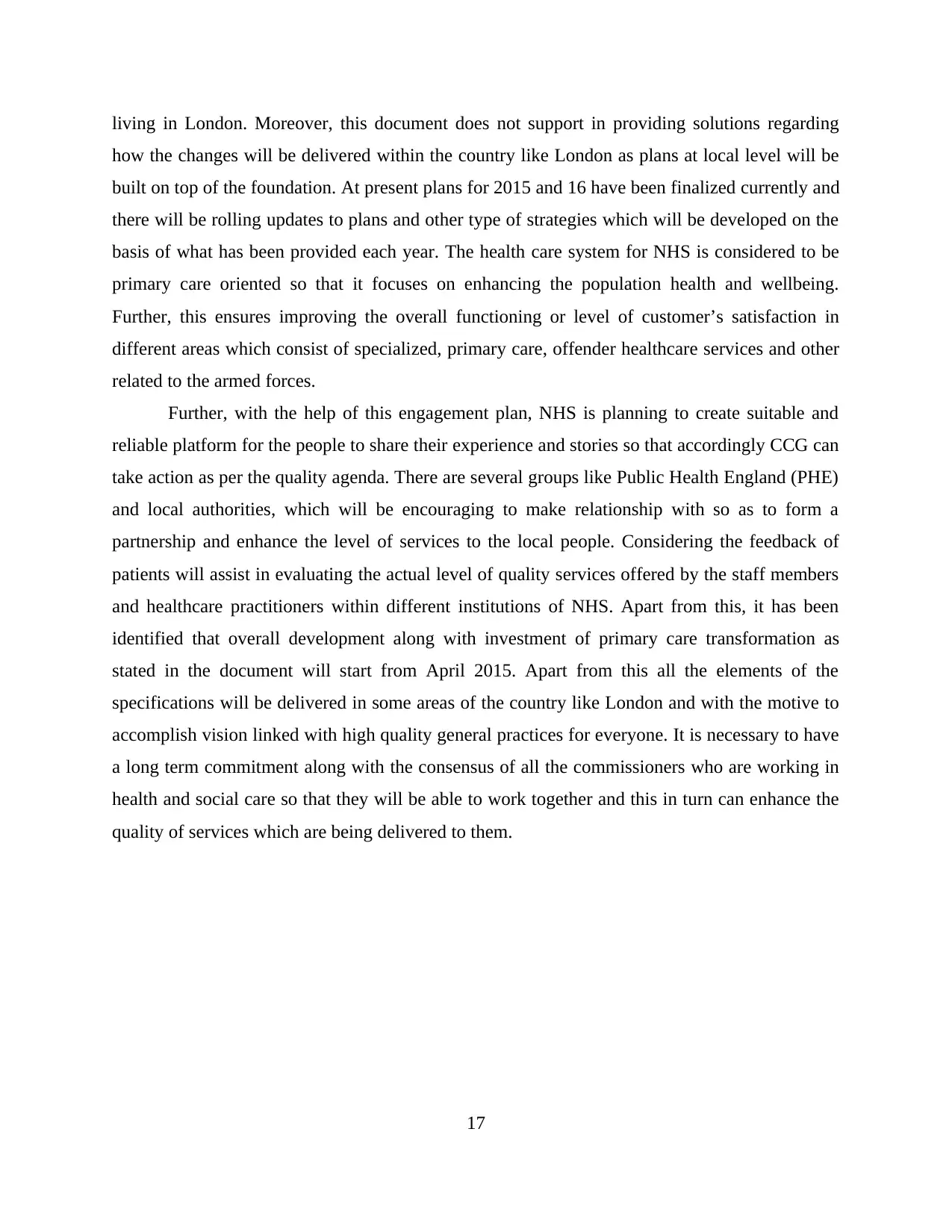
living in London. Moreover, this document does not support in providing solutions regarding
how the changes will be delivered within the country like London as plans at local level will be
built on top of the foundation. At present plans for 2015 and 16 have been finalized currently and
there will be rolling updates to plans and other type of strategies which will be developed on the
basis of what has been provided each year. The health care system for NHS is considered to be
primary care oriented so that it focuses on enhancing the population health and wellbeing.
Further, this ensures improving the overall functioning or level of customer’s satisfaction in
different areas which consist of specialized, primary care, offender healthcare services and other
related to the armed forces.
Further, with the help of this engagement plan, NHS is planning to create suitable and
reliable platform for the people to share their experience and stories so that accordingly CCG can
take action as per the quality agenda. There are several groups like Public Health England (PHE)
and local authorities, which will be encouraging to make relationship with so as to form a
partnership and enhance the level of services to the local people. Considering the feedback of
patients will assist in evaluating the actual level of quality services offered by the staff members
and healthcare practitioners within different institutions of NHS. Apart from this, it has been
identified that overall development along with investment of primary care transformation as
stated in the document will start from April 2015. Apart from this all the elements of the
specifications will be delivered in some areas of the country like London and with the motive to
accomplish vision linked with high quality general practices for everyone. It is necessary to have
a long term commitment along with the consensus of all the commissioners who are working in
health and social care so that they will be able to work together and this in turn can enhance the
quality of services which are being delivered to them.
17
how the changes will be delivered within the country like London as plans at local level will be
built on top of the foundation. At present plans for 2015 and 16 have been finalized currently and
there will be rolling updates to plans and other type of strategies which will be developed on the
basis of what has been provided each year. The health care system for NHS is considered to be
primary care oriented so that it focuses on enhancing the population health and wellbeing.
Further, this ensures improving the overall functioning or level of customer’s satisfaction in
different areas which consist of specialized, primary care, offender healthcare services and other
related to the armed forces.
Further, with the help of this engagement plan, NHS is planning to create suitable and
reliable platform for the people to share their experience and stories so that accordingly CCG can
take action as per the quality agenda. There are several groups like Public Health England (PHE)
and local authorities, which will be encouraging to make relationship with so as to form a
partnership and enhance the level of services to the local people. Considering the feedback of
patients will assist in evaluating the actual level of quality services offered by the staff members
and healthcare practitioners within different institutions of NHS. Apart from this, it has been
identified that overall development along with investment of primary care transformation as
stated in the document will start from April 2015. Apart from this all the elements of the
specifications will be delivered in some areas of the country like London and with the motive to
accomplish vision linked with high quality general practices for everyone. It is necessary to have
a long term commitment along with the consensus of all the commissioners who are working in
health and social care so that they will be able to work together and this in turn can enhance the
quality of services which are being delivered to them.
17
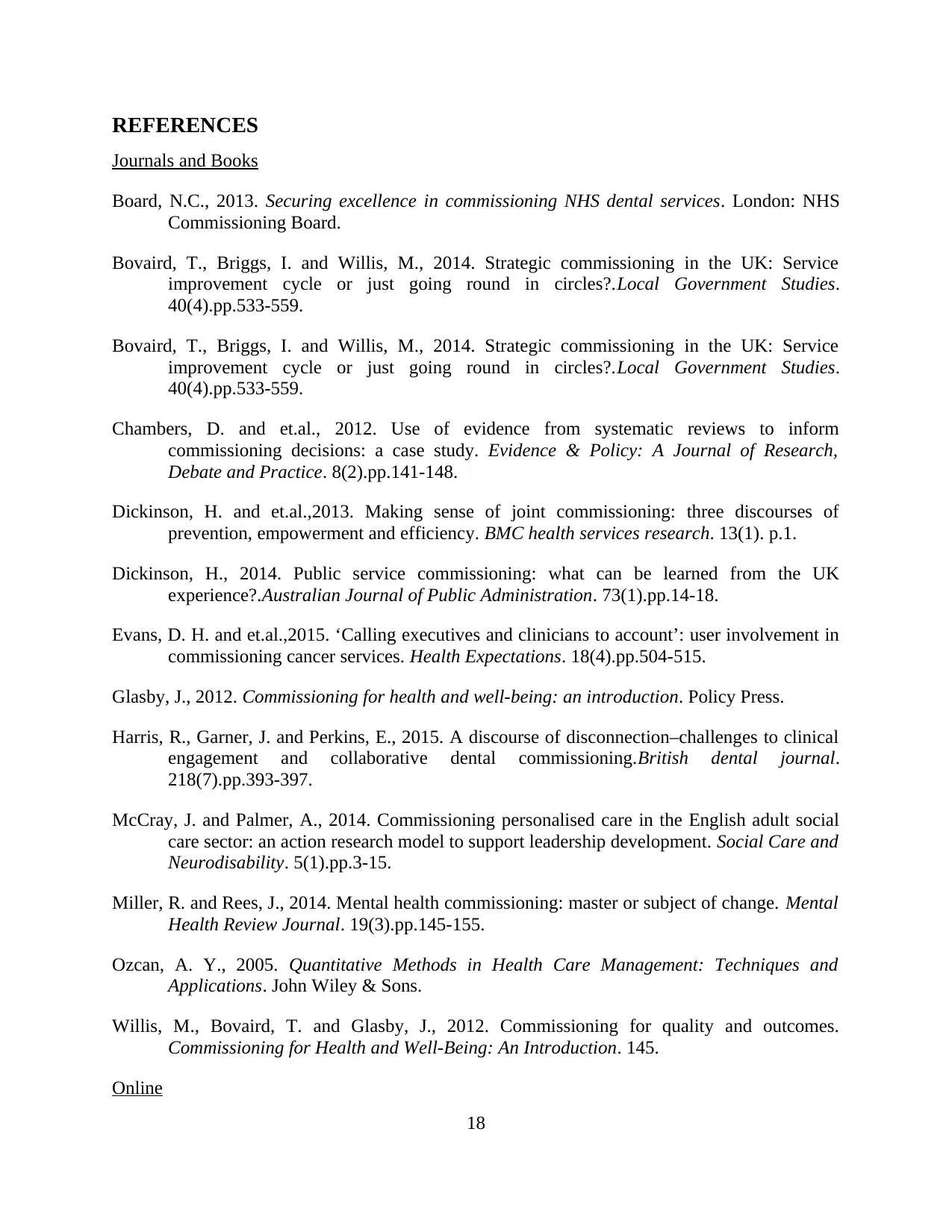
REFERENCES
Journals and Books
Board, N.C., 2013. Securing excellence in commissioning NHS dental services. London: NHS
Commissioning Board.
Bovaird, T., Briggs, I. and Willis, M., 2014. Strategic commissioning in the UK: Service
improvement cycle or just going round in circles?.Local Government Studies.
40(4).pp.533-559.
Bovaird, T., Briggs, I. and Willis, M., 2014. Strategic commissioning in the UK: Service
improvement cycle or just going round in circles?.Local Government Studies.
40(4).pp.533-559.
Chambers, D. and et.al., 2012. Use of evidence from systematic reviews to inform
commissioning decisions: a case study. Evidence & Policy: A Journal of Research,
Debate and Practice. 8(2).pp.141-148.
Dickinson, H. and et.al.,2013. Making sense of joint commissioning: three discourses of
prevention, empowerment and efficiency. BMC health services research. 13(1). p.1.
Dickinson, H., 2014. Public service commissioning: what can be learned from the UK
experience?.Australian Journal of Public Administration. 73(1).pp.14-18.
Evans, D. H. and et.al.,2015. ‘Calling executives and clinicians to account’: user involvement in
commissioning cancer services. Health Expectations. 18(4).pp.504-515.
Glasby, J., 2012. Commissioning for health and well-being: an introduction. Policy Press.
Harris, R., Garner, J. and Perkins, E., 2015. A discourse of disconnection–challenges to clinical
engagement and collaborative dental commissioning.British dental journal.
218(7).pp.393-397.
McCray, J. and Palmer, A., 2014. Commissioning personalised care in the English adult social
care sector: an action research model to support leadership development. Social Care and
Neurodisability. 5(1).pp.3-15.
Miller, R. and Rees, J., 2014. Mental health commissioning: master or subject of change. Mental
Health Review Journal. 19(3).pp.145-155.
Ozcan, A. Y., 2005. Quantitative Methods in Health Care Management: Techniques and
Applications. John Wiley & Sons.
Willis, M., Bovaird, T. and Glasby, J., 2012. Commissioning for quality and outcomes.
Commissioning for Health and Well-Being: An Introduction. 145.
Online
18
Journals and Books
Board, N.C., 2013. Securing excellence in commissioning NHS dental services. London: NHS
Commissioning Board.
Bovaird, T., Briggs, I. and Willis, M., 2014. Strategic commissioning in the UK: Service
improvement cycle or just going round in circles?.Local Government Studies.
40(4).pp.533-559.
Bovaird, T., Briggs, I. and Willis, M., 2014. Strategic commissioning in the UK: Service
improvement cycle or just going round in circles?.Local Government Studies.
40(4).pp.533-559.
Chambers, D. and et.al., 2012. Use of evidence from systematic reviews to inform
commissioning decisions: a case study. Evidence & Policy: A Journal of Research,
Debate and Practice. 8(2).pp.141-148.
Dickinson, H. and et.al.,2013. Making sense of joint commissioning: three discourses of
prevention, empowerment and efficiency. BMC health services research. 13(1). p.1.
Dickinson, H., 2014. Public service commissioning: what can be learned from the UK
experience?.Australian Journal of Public Administration. 73(1).pp.14-18.
Evans, D. H. and et.al.,2015. ‘Calling executives and clinicians to account’: user involvement in
commissioning cancer services. Health Expectations. 18(4).pp.504-515.
Glasby, J., 2012. Commissioning for health and well-being: an introduction. Policy Press.
Harris, R., Garner, J. and Perkins, E., 2015. A discourse of disconnection–challenges to clinical
engagement and collaborative dental commissioning.British dental journal.
218(7).pp.393-397.
McCray, J. and Palmer, A., 2014. Commissioning personalised care in the English adult social
care sector: an action research model to support leadership development. Social Care and
Neurodisability. 5(1).pp.3-15.
Miller, R. and Rees, J., 2014. Mental health commissioning: master or subject of change. Mental
Health Review Journal. 19(3).pp.145-155.
Ozcan, A. Y., 2005. Quantitative Methods in Health Care Management: Techniques and
Applications. John Wiley & Sons.
Willis, M., Bovaird, T. and Glasby, J., 2012. Commissioning for quality and outcomes.
Commissioning for Health and Well-Being: An Introduction. 145.
Online
18
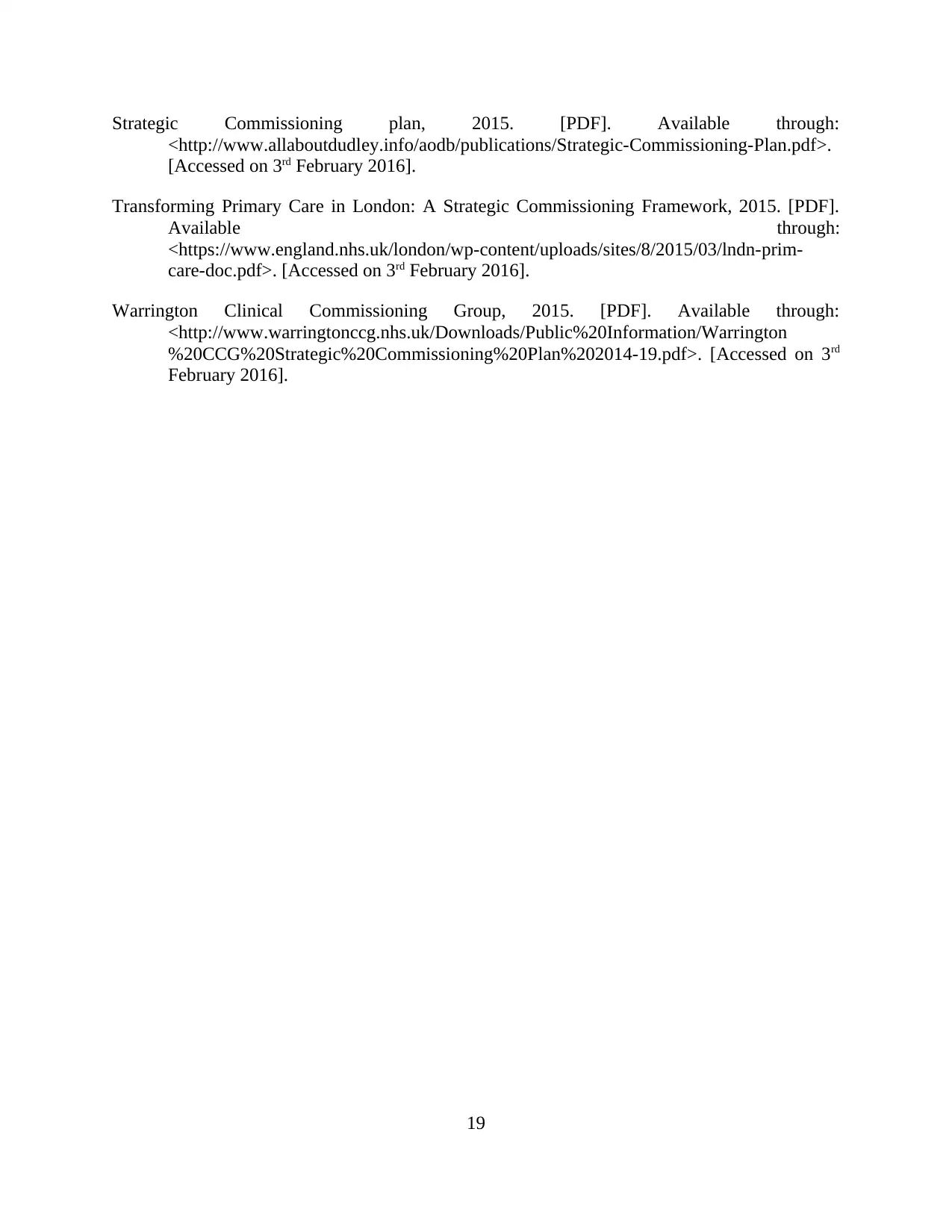
Strategic Commissioning plan, 2015. [PDF]. Available through:
<http://www.allaboutdudley.info/aodb/publications/Strategic-Commissioning-Plan.pdf>.
[Accessed on 3rd February 2016].
Transforming Primary Care in London: A Strategic Commissioning Framework, 2015. [PDF].
Available through:
<https://www.england.nhs.uk/london/wp-content/uploads/sites/8/2015/03/lndn-prim-
care-doc.pdf>. [Accessed on 3rd February 2016].
Warrington Clinical Commissioning Group, 2015. [PDF]. Available through:
<http://www.warringtonccg.nhs.uk/Downloads/Public%20Information/Warrington
%20CCG%20Strategic%20Commissioning%20Plan%202014-19.pdf>. [Accessed on 3rd
February 2016].
19
<http://www.allaboutdudley.info/aodb/publications/Strategic-Commissioning-Plan.pdf>.
[Accessed on 3rd February 2016].
Transforming Primary Care in London: A Strategic Commissioning Framework, 2015. [PDF].
Available through:
<https://www.england.nhs.uk/london/wp-content/uploads/sites/8/2015/03/lndn-prim-
care-doc.pdf>. [Accessed on 3rd February 2016].
Warrington Clinical Commissioning Group, 2015. [PDF]. Available through:
<http://www.warringtonccg.nhs.uk/Downloads/Public%20Information/Warrington
%20CCG%20Strategic%20Commissioning%20Plan%202014-19.pdf>. [Accessed on 3rd
February 2016].
19
1 out of 22
Related Documents
Your All-in-One AI-Powered Toolkit for Academic Success.
+13062052269
info@desklib.com
Available 24*7 on WhatsApp / Email
![[object Object]](/_next/static/media/star-bottom.7253800d.svg)
Unlock your academic potential
© 2024 | Zucol Services PVT LTD | All rights reserved.





